

The Thailand Tourist Visa Guide (Single & Multiple Entry)
The majority of foreign nationals are able to enter Thailand on a visa exemption stamp.
This means that when you enter Thailand you are given a stamp at the immigration desk that allows you to stay in the country for 30 days.
Okay, so now you're clear on how long you can stay when you arrive without a visa, what if you want to stay for 6 weeks, or 2 even months?
In this case, you can apply for a Tourist Visa before you travel.
In this FAQ guide, I'll answer all common queries regarding the Thailand Tourist Visa, both single and multiple entry.

1. Where can I get a Tourist Visa?
A Tourist Visa can be obtained from a Thai embassy or consulate in your home country, or a country outside of Thailand, if you live abroad or are already traveling.
You can also apply via the E-Visa online system. Indeed, some embassies may no longer accept applications for Tourist Visas and instead require you to apply online.
The E-Visa is delivered via email. You can then print it out and present it to immigration on arrival.
What different types of tourist visa are there?
A. single entry.
The Single Entry Tourist Visa is valid for 3 months from its date of issue. It allows a single stay of a maximum of 60 days.
B. Multiple entry
The Multiple Entry Tourist Visa is valid for 6 months from its date of issue.
It allows an unlimited number of entries within the 6-month validity of the visa. Each entry allows a maximum stay of 60 days.
For example, if you leave Thailand on the 59th day of your stay and re-enter the country a day later, you will be stamped in for a further 60 days.
What documents do I need to get the Tourist Visa?
The requirements may vary slightly between country, but this is usually what's required from your local embassy.
- A completed visa application form with two recent passport type photos attached. The form can be downloaded from your local Thai embassy website.
- Your passport must have a minimum 6 months remaining validity, and at least two blank pages – this is so your visa can be added to the passport, and for entry/exit stamps when entering and leaving Thailand.
- If you reside in a country but are not a citizen of that country, then you will be required to show a visa or residence card that permits you to stay. You will also be required to show evidence of where you live, by way of utility bill, bank account statement, or driving license.
- Two recent passport size photographs. You can get these done at a photo booth (in a mall or store) or at some print services shops.
- Confirmation of travel (flight tickets).
- Proof of accommodation in Thailand: this can be a copy of your hotel booking or a letter from the family or friend you are staying with.
- Copy of bank statement to show proof of earnings. This requirement will differ between countries, and differs for the single and multiple entry visas. For example, for a Single Entry Tourist Visa from a US Thai embassy, you will need a copy of your bank statement showing $700 per person and $1,500 per family. For a Multiple Entry Tourist Visa, you will need a copy of your bank statement for the last 6 months showing a minimum balance of $7,000 (every month).
Thailand's E-Visa System
If you are applying online through the E-Visa system, you will require the following documentation:
- Passport or travel document with a validity of not less than 6 months.
- Photograph taken within the past six months.
- Evidence of travel to Thailand (air ticket paid in full).
- Evidence of adequate finance (20,000 Baht per person and 40,000 Baht per family).
Please note that you are not required to submit any supporting documents in person at a Royal Thai Embassy or Consulate after completing the E-Visa application. Once approved, a confirmation e-mail will be sent through and you can print a copy of the confirmation e-mail to present to airline and Thai Immigration officials.
You can apply online here: https://www.thaievisa.go.th
Historically, Thailand's online systems have always fallen way short of expectations, with browser compatibility issues, bugs, broken links, etc., but the new visa system is working pretty well.
For those who deem themselves digitally challenged, there is a comprehensive user manual. This manual is also available as a series of how-to videos, which are very helpful. You can find the manual here.
How much does a Thai Tourist Visa cost?
The cost varies between country, but here is the cost for the US and UK:
- US: Single – $40. Multiple Entry – $200
- UK: Single – £30. Multiple Entry – £150
How long does it take to process a Tourist Visa?
If you attend the Thai embassy in person, the process will take around 5 working days. If you apply by mail, the process will take a minimum of 15 days.
Applying online will take 6-10 working days.
This is a general guideline and will differ between countries, and may be longer or shorter depending on how busy the embassy/consulate is.
I would personally allow 2 weeks if applying in person or online, and 3 weeks if applying by mail. This will ensure you get your visa before your flight date.
When is my Tourist Visa valid from?
The Single Entry Tourist Visa is valid 3 months from date of issue, and the Multiple Entry Tourist Visa is valid for 6 months from date of issue.
When you enter Thailand, you will be stamped in for 60 days.
Note: The expiry date of the visa shows on the visa sticker as ‘ENTER BEFORE'. When you enter Thailand, you will receive a rectangular stamp in your passport stating your date of entry and the ‘ADMITTED UNTIL' date. This date will be exactly 60 days after your date of entry
What happens if I leave Thailand before my 60-day stay is up?
If you leave prior to your 60-day stay ending, the remaining days will be forfeited.
If you think you will want to leave Thailand and re-enter, you should get a Multiple Entry Tourist Visa.
The Multiple Entry Tourist Visa is valid for 6 months from date of issue. You are allowed unlimited entries within the 6-month period of the visa. If you exit Thailand, as long as you re-enter before the visa expires, you will be stamped in for a further 60 days.
Can I extend my visa inside Thailand?
For those who want to extend their stay in Thailand, you can extend the 60-day Single Entry Tourist Visa by 30 days at a local Immigration Office. The fee for the extension is 1,900 Baht.
Under the Multiple Entry Visa, you can extend one of the 60-day stays by a further 30 days. The cost is the same.
Under the Multiple Entry Tourist Visa, by saving the 30-day extension for your final entry, you can accumulate almost 9 month's stay in Thailand.
Can I cancel my visa and get a refund?
No. The visa fee is non-refundable.
Can't I just do border runs instead of getting a Tourist Visa?
Because you are granted 30 days stay on arrival in Thailand, in theory you could just leave over a land border after 30 days and return the same day, activating a further 30 day's stay.
This is known as a border run . People used to stay in Thailand for years just going back and forth over the border.
However, the current rule is that if you enter Thailand over land without a visa, you are allowed a maximum of two 30-day entries within any rolling 12-month period.
With a Multiple Entry Tourist Visa, you can go in an out as many times as you want within the validity of the visa.
Did I miss anything? Got a question? Leave it below.
Tips to Start Planning Your Trip Now:
Book your accommodation.
Best hotel rates are found at Agoda and Hotels.com .
Don’t Forget Travel Insurance
Travel insurance protects you against illness, injury, theft, and cancellations. I never travel without it. I’ve been using SafetyWing for years. You should too.
Thinking about a backpack?
Check out this guide for the best options.
GET MY NEWSLETTER
Join thousands of others who receive my monthly roundup of content & insider tips on how to survive & thrive in Thailand.
Last Updated on January 17, 2024

Comments Sort by : newest | oldest
April 23, 2024 at 12:01 am
Apr 23, 2024 at 12:01 am
TheThailandLife says
April 23, 2024 at 12:10 am
Apr 23, 2024 at 12:10 am
February 29, 2024 at 5:05 am
Feb 29, 2024 at 5:05 am
February 29, 2024 at 6:30 pm
Feb 29, 2024 at 6:30 pm
March 1, 2024 at 2:34 am
Mar 01, 2024 at 2:34 am
March 1, 2024 at 6:32 pm
Mar 01, 2024 at 6:32 pm
September 4, 2023 at 6:36 pm
Sep 04, 2023 at 6:36 pm
Leave a Reply Cancel reply
Your email address will not be published. Required fields are marked *
Notify me when new comments are added.
Visa Traveler
Exploring the world one country at a time
Thailand tourist visa: Requirements and application procedure
Updated: April 6, 2023
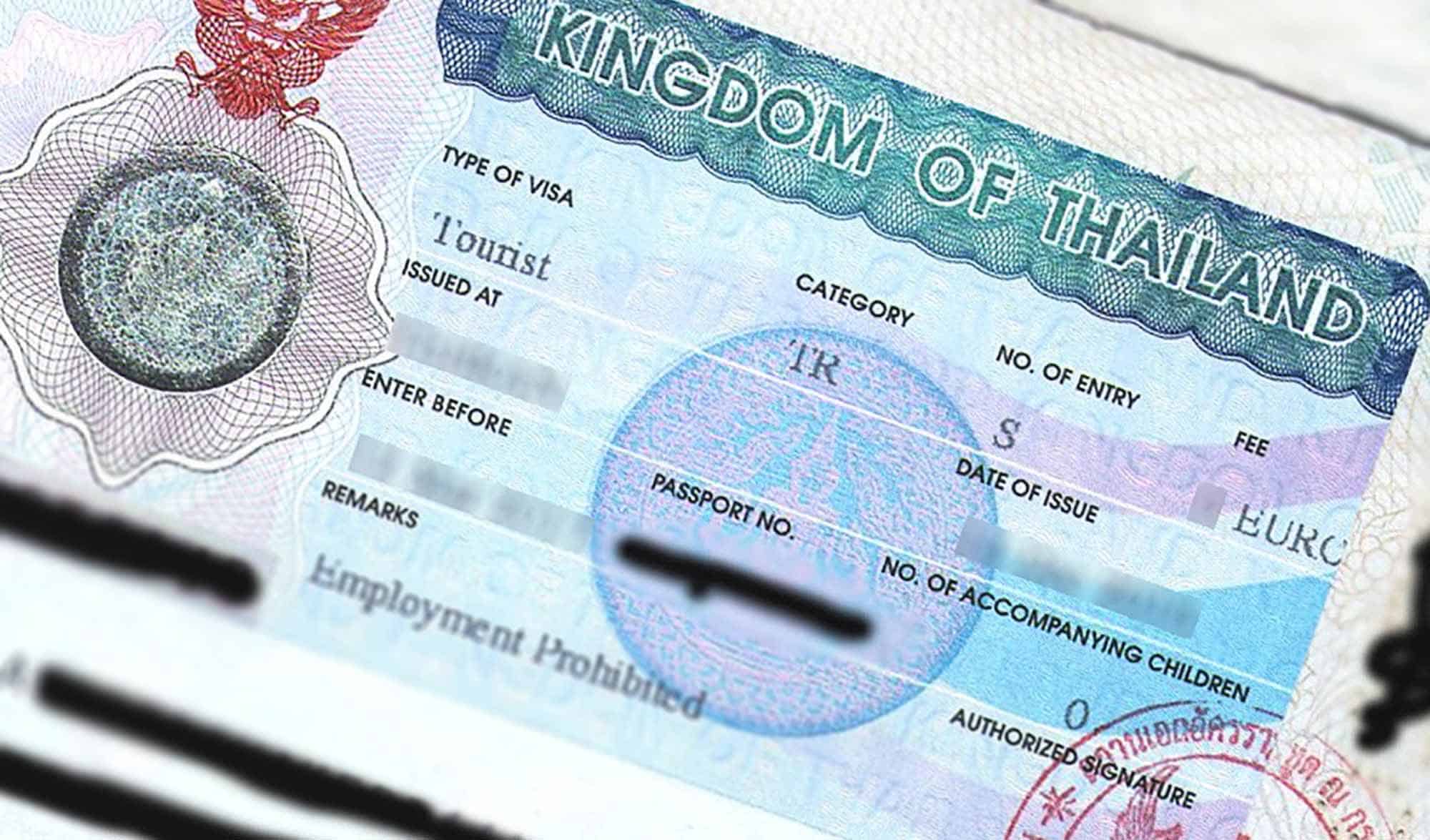
Thailand has a liberal visa policy offering Visa EXEMPTION and Visa ON ARRIVAL to many nationalities in the world. For those who REQUIRE a visa, Thailand tourist visa is the easiest to obtain if you understand and follow the visa requirements properly.
There 5 ways you can enter Thailand as a tourist.
- Visa Exemption
- Visa on Arrival (VOA)
- Pre-approved visa from Thai embassy
A Thailand tourist visa is only for visiting Thailand for the purpose of tourism for a short period of time. If you plan to stay longer, look into Thai ED Visa , which allows you to study and live in Thailand for up to one year.
Without further delay, let’s dive into Thailand visa requirements, eligibility, application procedure and entry-exit formalities at the airport.
Table of Contents
Thailand tourist visa requirements by nationality.
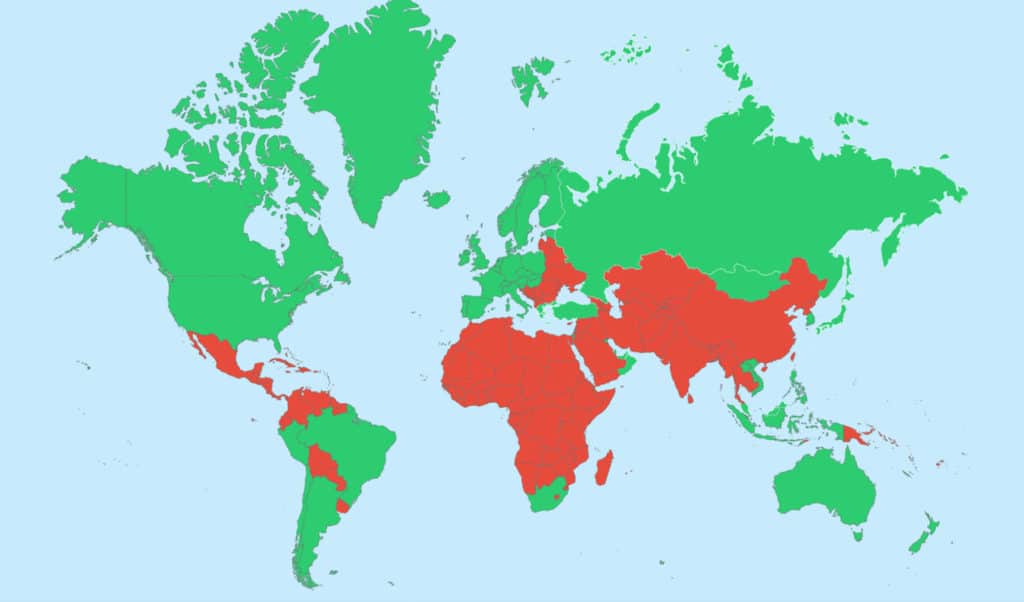
Minimum passport validity required to enter Thailand as a tourist
For visa EXEMPT and visa REQUIRED nationalities, the passport must be valid for at least 6 months from the day of arrival in Thailand.
For visa ON ARRIVAL eligible nationalities, the passport must be valid for at least 30 days from the day of arrival in Thailand.
VISA EXEMPT nationalities
90-day entry.
- South Korea
30-day entry
- Czech Republic
- Liechtenstein
- Myanmar (* only if entering by air)
- Netherlands
- New Zealand
- Philippines
- South Africa
- Switzerland
- United Arab Emirates
- United Kingdom
- United States
Visa ON ARRIVAL or e-VOA eligible nationalities
15-day entry.
- Papua New Guinea
- Saudi Arabia
E-VISA eligible nationalities
60-day entry.
- Citizens or permanent residents of the following countries are eligible for E-Visa.
- Bosnia and Herzegovina
- Congo, Rep. of
- Congo, Dem. Rep. of
- Dominican Republic
- North Korea
- Trinidad and Tobago
- Vatican City
Visa REQUIRED nationalities
- Afghanistan
- Antigua and Barbuda
- Burkina Faso
- Cayman Islands
- Central African Republic
- Cote d’Ivoire
- El Salvador
- Equatorial Guinea
- Guinea-Bissau
- Marshall Islands
- North Macedonia
- Saint Kitts and Nevis
- Saint Lucia
- Saint Vincent And The Grenadines
- Sao Tome and Principe
- Sierra Leone
- Sint Maarten
- Solomon Islands
- South Sudan
- Timor-Leste
- Turkmenistan
THAILAND VISA EXEMPTION
Currently, Thailand offers visa exemption to 64 countries. Most countries in that list get a 30-day entry. Just a handful of countries in South America and South Korea get 90-day entry.
How long can you stay in Thailand with visa exemption
Argentina, Brazil, Chile, Peru and South Korea nationals can stay up to 90 days in Thailand. All other visa-exempt nationalities can stay up to 30 days in Thailand.
Except for G7 countries (Canada, France, Germany, Italy, Japan, United Kingdom, and the United States), all other nationalities will be granted only a 30-day entry if entering by land.
Malaysia passport holders are granted 30-day entry when entering by land from Malaysia.
How many times can you enter Thailand with visa exemption
There are no restrictions on entering Thailand by air. But you can only enter 2 times in a given year by land.
Passport validity required for visa exemption
Your passport must be valid for at least 6 months from the day of arrival in Thailand.
Documents to carry for visa exemption
- Original passport
- Proof of onward ticket
- Proof of funds (20,000 THB for individuals and 40,000 THB for families)
Your passport must be valid for at least 6 months from the day of arrival in Thailand.
Your proof of onward ticket can be a print or a copy on your phone. This cannot be a bus or train ticket. This must a flight ticket. If you are traveling on a one-way ticket or planning to take a bus or train to Laos or Cambodia, get a dummy proof of an onward flight ticket .
Proof of funds can be cash, ATM cards or credit cards. There were incidents where tourists were forced to show proof of funds in the form of cash. To avoid unnecessary trouble, I suggest carrying a bit of cash on you in Thai Baht or any major currency.
THAILAND VISA ON ARRIVAL (VOA)
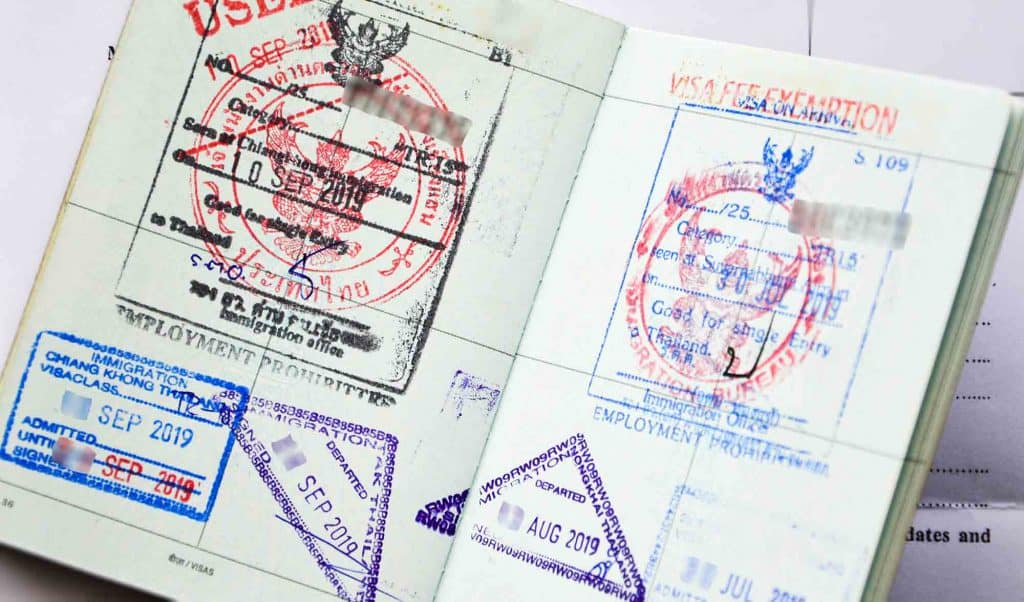
Thailand is a popular tourist destination in South East Asia, partly due to its liberal visa-exemption and Visa on Arrival policies. Currently, 18 nationalities can obtain Thailand Visa on Arrival at all international airports and land checkpoints with minimal documentation.
How long can you stay in Thailand with Visa on Arrival (VOA)
You can stay up to 15 days on Visa on Arrival (VOA). No visa extensions are allowed.
How many times can you obtain Visa on Arrival (VOA)
If you are traveling to many countries in South East Asia, you may have to enter Thailand multiple times. You can obtain Visa on Arrival multiple times on your trip without any problems.
PERSONAL EXPERIENCE I obtained Visa on Arrival (VOA) at the airport and later at a land border in Thailand on my South East Asia trip and I was fine.
Passport validity required for Visa on Arrival (VOA)
Your passport must be valid for at least 30 days from the day of arrival in Thailand.
Documents required for Visa on Arrival (VOA)
The following documents are required for Visa on Arrival (VOA).
- Completed Thailand Visa on Arrival application form
- One passport-size photo (4×6 cm)
- Return/onward flight ticket (must be within 15 days of arrival in Thailand)
- Hotel booking confirmation (minimum 5 nights)
- Proof of funds (10,000 THB for individuals and 20,000 THB for families)
Print and complete your Thailand Visa on Arrival application form before heading on your trip to Thailand. If you can’t print it, you can always grab one at the airport and fill it out.
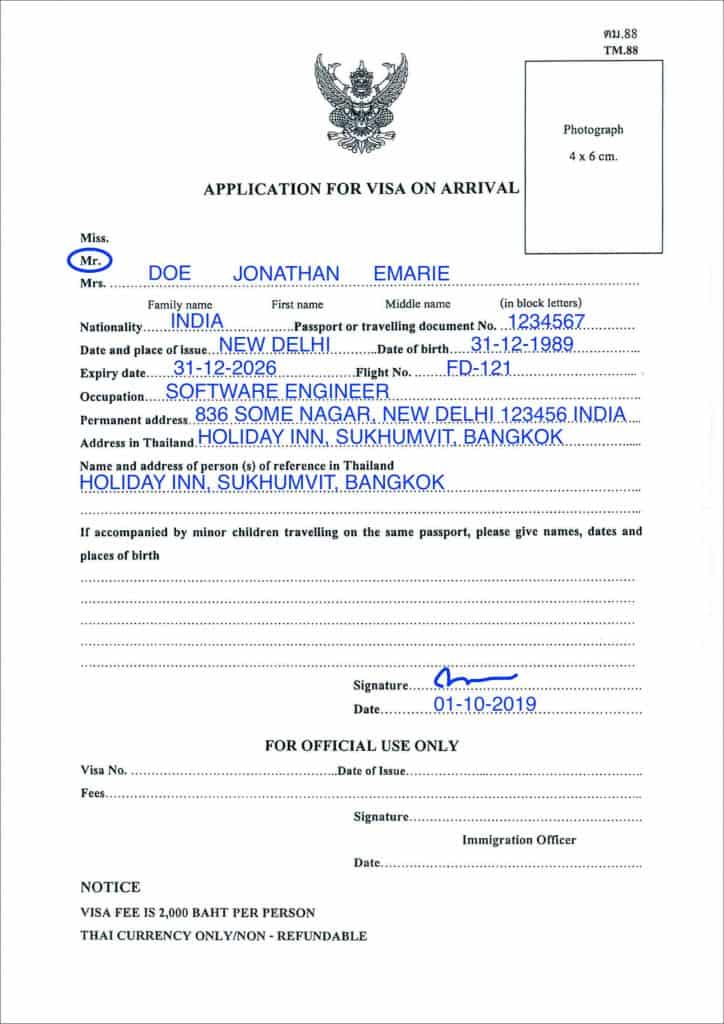
A return/onward flight ticket is mandatory and it must be within 15 days of arrival in Thailand. If your return ticket is over 15 days, you will be forced to rebook another flight ticket by the Visa on Arrival staff. You will end up spending a lot on rebooking so make sure your flight ticket is within 15 days.
Your return or onward ticket must be a flight ticket. Bus or train tickets are not acceptable. If you plan to travel to a neighboring country by land, you must still provide a flight ticket as proof of onward travel .
If you plan on traveling to a neighboring country by bus or train, get a dummy onward flight ticket for your Visa on Arrival.
Hotel booking is mandatory. A minimum of 5 nights or more is required. Booking a hotel for the first 1 or 2 nights will not work. You will be forced to book the remaining nights by the VOA staff at the airport.
Proof of funds must be a minimum of 10,000 THB for individuals and 20,000 THB for families. You would need to show proof of funds in cash. You can get away by saying that you have your debit and credit cards on you. But, I strongly suggest you have at least 5,000 THB on your and for the remaining, you can show your debit card, credit card and bank statements.
Visa on Arrival (VOA) photo size
The photo must be of size 4 x 6 cm. It must have been taken within the last 6 months. You may need 1-2 photos for your visa depending on the checkpoint. Carry at least 2 photos for Visa on Arrival at the land borders.
Visa on Arrival (VOA) fee
Thailand Visa ON ARRIVAL fee is 2,000 THB. This fee must be paid in cash in Thai Baht (THB) only.
You may be forced to pay an additional 200 THB as an express fee for fast processing of your VOA. Sometimes you will not have a choice but to pay this express fee.
Money exchanges are available near the Visa on Arrival sections in the airports. No ATMs are available, so make sure to carry cash in THB or any major currency.
Visa on Arrival (VOA) processing time
Visa on Arrival process at airports is quick these days. It used to take at least an hour before. Either way, account for an additional one hour for your Visa on Arrival process at the airport just in case.
To save time, you can download and fill out the Visa on Arrival application form prior to your arrival.
RELATED: How to get a 15-day Thailand Visa on Arrival (VOA) in 2023 – A complete guide
THAILAND ONLINE VISA ON ARRIVAL (e-VOA)
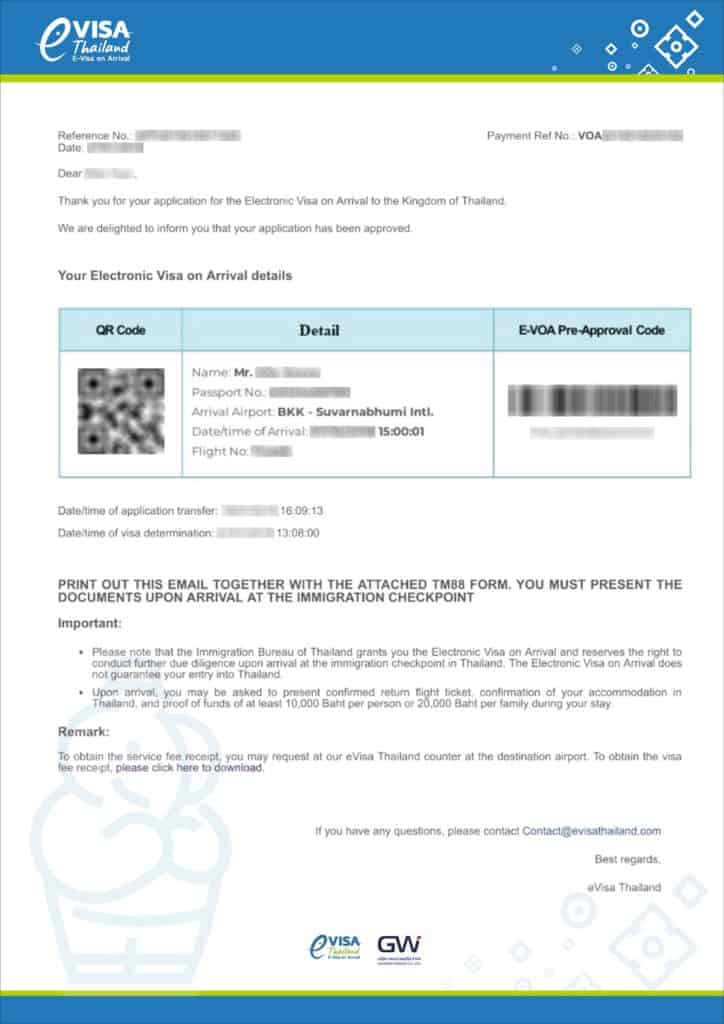
Thailand e-VOA speeds up the process of obtaining Visa on Arrival (VOA) at the airport. If you hold an e-VOA, you can skip the regular Visa on Arrival lines at the airports.
All 18 nationalities that are eligible for Visa on Arrival can obtain e-VOA online.
There are special counters set up at the airports just for e-VOA holders for obtaining Visa on Arrival. You do not need to carry supporting documents or the visa fee. All you need is your original passport, e-VOA approval and proof of funds.
IMPORTANT e-VOA is NOT eVISA. Even with an e-VOA, you still have to go through the Visa on Arrival process and obtain your VOA stamp at the airport. It ONLY speeds up the process of obtaining Visa on Arrival at the airport since your document check and visa fee payment were already done online.
Hong long can you stay in Thailand with e-VOA
You can stay up to 15 days using e-VOA. No visa extensions are allowed.
Passport validity required for e-VOA
Blank pages needed in the passport for e-voa.
You must have at least 1 blank page in your passport.
Where to enter Thailand with e-VOA
With an approved e-VOA, you can only enter Thailand from the below 4 international airports.
- Suvarnabhumi International Airport in Bangkok (BKK)
- Don Mueang International Airport in Bangkok (DMK)
- Chiang Mai International Airport (CNX)
- Phuket International Airport (HKT)
NOTE If you plan to enter Thailand from an airport other than the above 4 or from a land border, you must opt for the regular Visa on Arrival. You CANNOT use e-VOA.
Thailand e-VOA application procedure
To obtain Thailand e-VOA, you must fill out an online visa application and upload the required documents. Pay the Visa on Arrival fee, service charge and tax. You will receive your e-VOA result in 1-3 working days.
Once your e-VOA is approved, print your e-VOA approval. You must present your passport, e-VOA approval and arrival/departure card at the Visa on Arrival counters at the airport. The 15-day Visa on Arrival will be stamped in your passport.
You can apply for e-VOA from any one of the two authorized visa agents. These are the only 2 agents authorized by Thai immigration.
- eVisa Thailand E-Visa on Arrival | THB 495.33 processing fee plus 7% VAT
- Thailand eVisa on Arrival by VFS Global | THB 500 processing fee
Documents required for e-VOA
The following documents are required for e-VOA.
- Passport cover page
- Passport ID page
- Digital photo (4×6 cm)
- Round trip flight tickets (return flight must be within 15 days of arrival in Thailand)
- Hotel booking confirmations for the entire stay
Thailand e-VOA fee
The fee for e-VOA is 2,000 THB. The visa agent will charge a service fee of 500 THB and tax on top of the visa fee. The visa fee can only be paid in Thai Baht using a credit/debit card.
The additional THB 500 service fee is non-refundable in case of e-VOA rejection.
e-VOA processing time
The processing time for e-VOA is 1-3 working days. Express processing is also available for an additional fee where the application will be processed within 24 hours.
e-VOA application tracking
Both eVisa Thailand and VFS Global offer visa application status tracking.
THAILAND E-VISA
Thailand E-Visa is an initiative from Thai immigration to move the Thai visa process online. The idea is to replace the regular pre-approved visa from the embassy with the new E-Visa. The visa validity and entry are exactly the same as the pre-approved visa from the embassy.
Thailand’s E-Visa portal offers both single and multiple-entry visas. You can apply for either one. But if the officers are not convinced that you need a multiple-entry visa, they may simply issue a single-entry visa. The fee for the multiple-entry visa is not refunded in that case.
Validity of Thailand E-Visa
Thailand E-Visa is valid for 3 months or 6 months depending on the entry type.
- Single-Entry: Valid for 3 months
- Multiple-Entry: Valid for 6 months
When to apply for E-Visa
You can apply for a Thai E-Visa up to 3 months prior to your trip. The processing takes about 3-10 working days, so it’s recommended to apply at least a month prior to your trip.
How long can stay in Thailand on E-Visa
You can stay up to 60 days in Thailand on your single-entry Thailand E-Visa.
With a multiple-entry E-Visa, you can stay up to 60 days on each entry. All entries must be made within the validity of your multiple-entry E-Visa. Meaning, even if you enter Thailand on the last day of your E-Visa, you will still receive a 60-day entry.
Both single-entry and multiple-entry E-Visas are extendable for additional 30 days at the local immigration office.
Passport validity required for E-Visa
At the time of lodging your E-Visa application, your passport must be valid for at least 6 months for a single-entry E-Visa and 1 year for a multiple-entry E-Visa.
E-Visa application procedure
You can apply for your E-Visa on the Thai E-Visa portal . You must fill out the online application, upload the required documents and pay the required visa fee.
The Thai Ministry of Foreign Affairs has created a nice step-by-step video guide and a PDF guide on how to apply for your E-Visa using the Thai E-Visa portal.
Documents required
The following documents are required for the Thai E-Visa.
- A scan of your passport ID page
- A digital photo (4×6 cm)
- Fully paid round-trip flight tickets
- Proof of residence (if not a citizen of the country where you are applying from)
All scanned documents must be in JPG format only. Max allowed file size is 3MB.
Photo requirements
The digital photo must meet the following requirements.
- Photo must have been taken in the last 6-months
- Must be 4×6 cm in dimensions
- Must be in JPG format only
- Max file size allowed is 3MB
The Thailand E-Visa fee is $40 USD for a single-entry tourist visa, paid in the local currency of the Thai consulate you have selected in your E-Visa application. E-Visa fees can only be paid using a credit/debit card.
Processing time
The processing time for E-Visa is 3-10 working days.
Application tracking
The application can be tracked within the dashboard of your account in the E-Visa portal.
THAILAND TOURIST VISA FROM THE EMBASSY
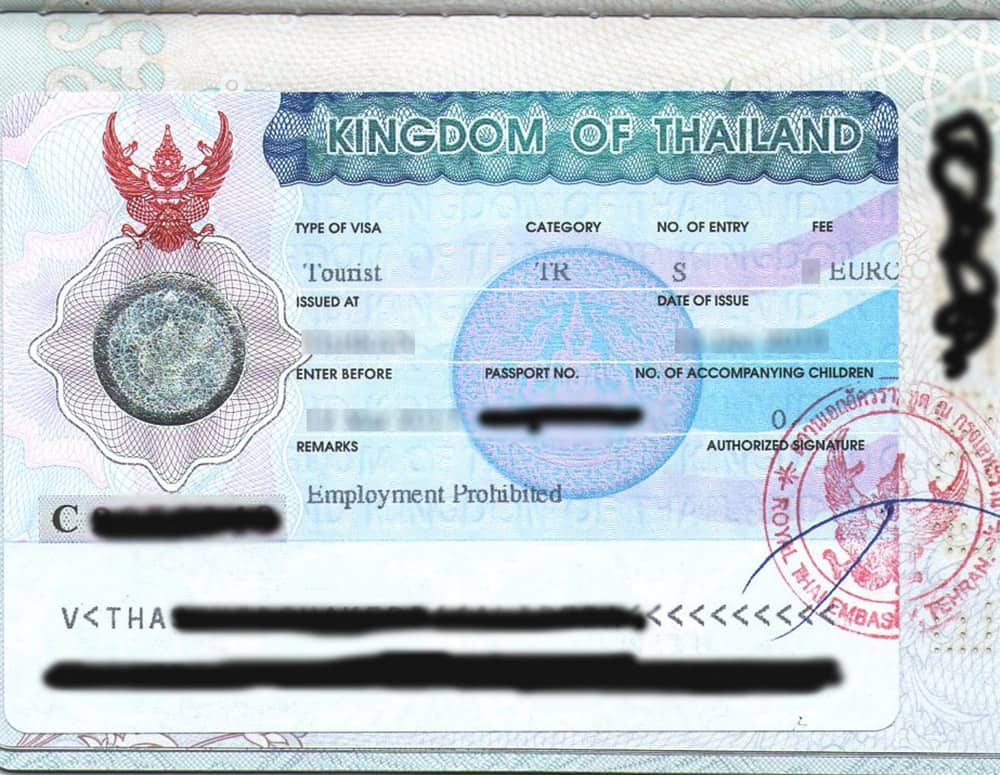
The following are eligible to apply for a pre-approved tourist visa.
- Visa REQUIRED nationality that are not eligible for Thai E-VISA
- Visa ON ARRIVAL eligible nationality that would need to stay longer than 15 days and are not eligible for Thai E-Visa
- Visa EXEMPT nationality that would need to stay longer than 30 days and are not eligible for Thai E-Visa
Validity of Thailand tourist visa
A single-entry Thailand tourist visa is valid for 3 months. You must enter Thailand within the validity of this visa.
A multiple-entry Thailand tourist visa is valid for 6 months. You can enter Thailand unlimited times on this type of visa and all entries must be within the validity of the visa.
When to apply for Thailand tourist visa
You can apply for a Thailand tourist visa up to 3 months prior to your trip. The processing can take from 3-10 working days so it’s recommended to apply at least one month prior to your trip.
How long can you stay in Thailand on a tourist visa
You can stay up to 60 days on a single-entry Thailand tourist visa. A 30-day extension is possible from the local immigration office.
You can stay up to 60 days for each entry on a multiple-entry tourist visa. A 30-day extension is possible from the local immigration office.
Passport validity required for tourist visa
Your passport must be valid for at least 6 months at the time of applying for your tourist visa.
Blank pages needed in the passport for tourist visa
You must have at least two blank pages in your passport for the tourist visa. One page for the visa sticker and one page for entry and exit stamps.
Thailand tourist visa application procedure
You can apply for a Thailand tourist visa in person at your nearest Royal Thai embassy or using an authorized visa agent such as VFS Global.
Here is an informational video made by the Royal Thai consulate in Kuala Lumpur, Malaysia on how to fill and arrange the documents for your Thailand tourist visa.
IMPORTANT If you are a Visa REQUIRED nationality, you can ONLY apply for a Thailand tourist visa in your country of passport or residence. That means You CANNOT apply for a Thailand tourist visa while traveling.
If you do not have a Thai mission in your country of passport or residence, you must apply at a Thai mission in a neighboring country that is specifically designated for applicants from your country.
The following documents are required for Thailand tourist visa.
- Completed Thailand tourist visa application form (you can download it from your nearest Royal Thai embassy website)
- Original passport with at least 6 months of validity with 2 blank pages
- Copies of your passport data/ID page and last page (2-3 copies depending on the Thai embassy where you are applying from)
- Passport size photos (1-4 photos depending on the Thai embassy where you are applying from)
- Roundtrip flight tickets (fully paid and confirmed for certain Thai embassies)
- Hotel reservations for the entire trip
- Full itinerary (full itinerary of your entire stay on a sheet of paper)
- Bank statements (last 6 months showing at least $700 USD per individual or $1,400 USD per family)
- Proof of residence (if applying from a country other than the country of passport)
The passport photo for the visa application must meet the following requirements.
- Must be of size 3.5 x 4.5 cm
- Must be latest taken in the last 3 months
- Must be on a white background without glasses or a hat
You may need 1-4 photos for your visa depending on the nationality. Carry about 4 photos when heading to the embassy.
Thailand tourist visa fee is 1,000 THB ($30 USD) for a single-entry tourist visa and 5,000 THB ($145 USD) for a multiple-entry tourist visa. You have to pay the visa fee in your local currency, so the visa fee may vary a bit due to currency exchange rates.
Visa agents such as VFS Global charge an additional service fee, courier fee, handling charges, etc. on top of the visa fee.
Thailand tourist visa processing time is 3 to 10 working days. Most applications are processed within 3 working days but if the embassy requires additional documents from you, it can take up to 10 working days.
Thai consulates, embassies, and authorized visa agents provide visa status updates via email. VFS Global provides online visa application tracking for its applicants.
ENTRY AND EXIT PROCEDURE AT THE AIRPORT
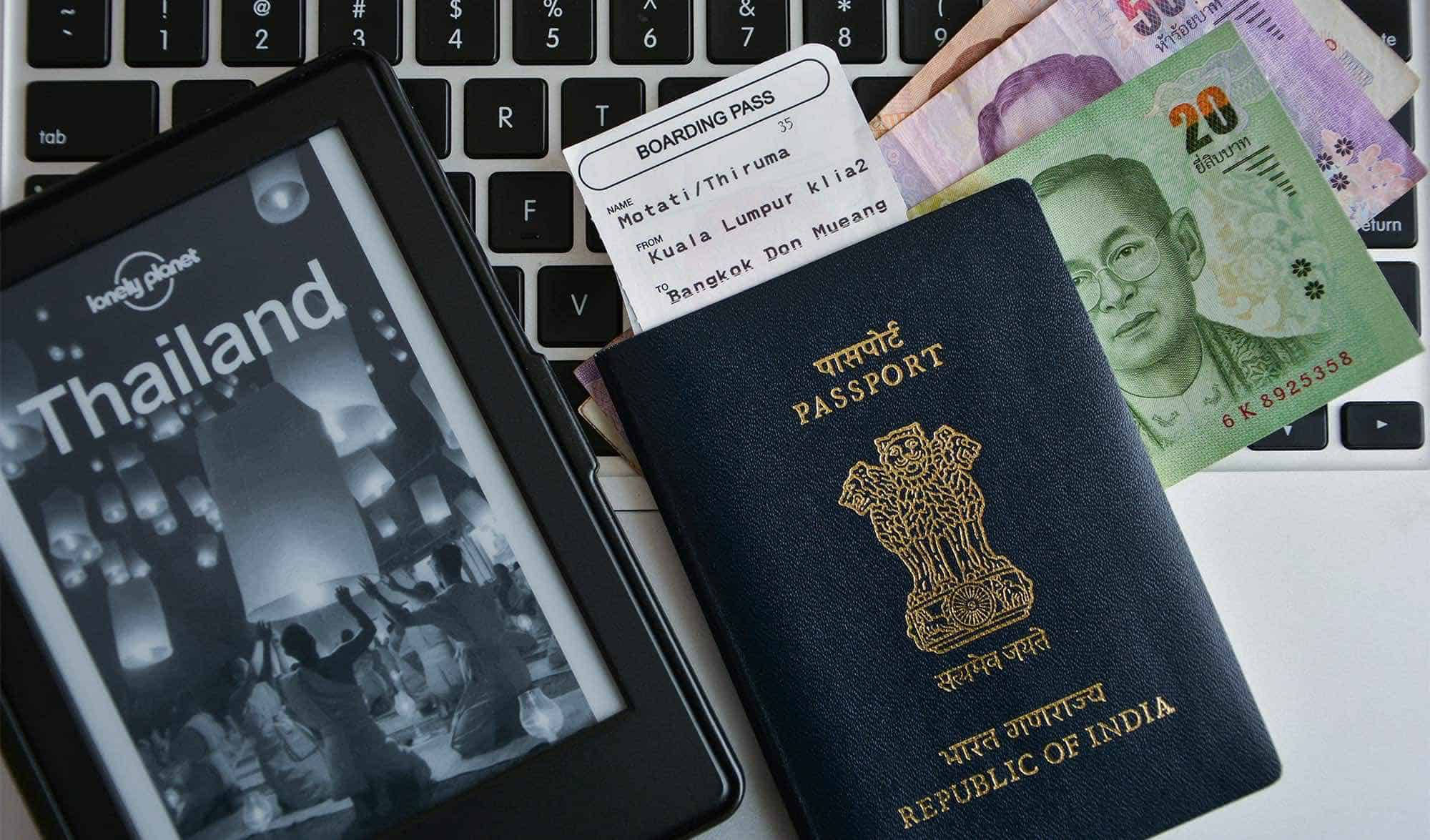
Entering Thailand by air
If you are a visa-exempt nationality, hold an E-Visa or a pre-approved Thailand tourist visa, head straight to immigration.
If you need to obtain Visa on Arrival (VOA), head to the Visa on Arrival section first. To speed up the Visa on Arrival process, you can either opt for e-VOA or express lanes at the airport. You can also download and fill out the Visa on Arrival application form before you arrive at the airport.
If you don’t have a completed Visa on Arrival form with you, grab one at the Visa on Arrival section. There will be examples of completed application forms on the wall to assist you with filling out the application form.
IMPORTANT Visa on Arrival fee can only be paid in THB. There are NO ATMs at the Visa on Arrival sections in any of the Thailand airports. So, make sure to carry enough cash in THB (Thai Baht) or major currency. There are currency exchanges at Visa on Arrival sections. So if you have some major currency on you, you can change it into THB.
After you complete your Visa on Arrival procedure, head to the immigration area.
Leaving Thailand by air
On exiting Thailand, you will have to go through passport control. You must present the following documents
- Your original passport
- Airline boarding pass
If flying out of Bangkok (BKK and DMK), long lines at check-in counters and passport control are common. Arrive at least 2 hours before your departure time.
ENTRY AND EXIT PROCEDURE AT THE LAND BORDER
Entering thailand by land.
If you are a visa-exempt nationality, hold an E-Visa or a pre-approved Thailand visa, head straight to immigration.
If you have to obtain Visa on Arrival (VOA), head to the Visa on Arrival section first. To speed up the Visa on Arrival process, you can download and fill out the Visa on Arrival application form before you arrive at the land border.
IMPORTANT The Visa on Arrival fee can only be paid in THB. ATMs and currency exchanges are very rare at the land borders. So, make sure to carry enough cash in THB (Thai Baht).
Leaving Thailand by land
On exiting Thailand by land, you must go through passport control. You must present the following documents
- Visa to the next country
If the next country you will be entering requires a visa, you must present the visa of that country. Otherwise, you will not be allowed to leave Thailand. If you will be obtaining Visa on Arrival in the next country, just say that you will obtain Visa on Arrival and you will be fine.

Thailand offers Visa EXEMPTION and Visa ON ARRIVAL to many nationalities. For those who REQUIRE a visa, a Thailand tourist visa is quite easy to obtain. Currently, 18 nationalities are eligible to obtain Visa on Arrival (VOA) and over 50 nationalities can obtain E-Visa. Rest requires a pre-approved visa from the embassy.
WRITTEN BY THIRUMAL MOTATI

Thirumal Motati is an expert in tourist visa matters. He has been traveling the world on tourist visas for more than a decade. With his expertise, he has obtained several tourist visas, including the most strenuous ones such as the US, UK, Canada, and Schengen, some of which were granted multiple times. He has also set foot inside US consulates on numerous occasions. Mr. Motati has uncovered the secrets to successful visa applications. His guidance has enabled countless individuals to obtain their visas and fulfill their travel dreams. His statements have been mentioned in publications like Yahoo, BBC, The Hindu, and Travel Zoo.
PLAN YOUR TRAVEL WITH VISA TRAVELER
I highly recommend using these websites to plan your trip. I use these websites myself to apply for my visas, book my flights and hotels and purchase my travel insurance.
01. Apply for your visa
Get a verifiable flight itinerary for your visa application from DummyTicket247 . DummyTicket247 is a flight search engine to search and book flight itineraries for visas instantly. These flight itineraries are guaranteed to be valid for 2 weeks and work for all visa applications.
02. Book your fight
Find the cheapest flight tickets using Skyscanner . Skyscanner includes all budget airlines and you are guaranteed to find the cheapest flight to your destination.
03. Book your hotel
Book your hotel from Booking.com . Booking.com has pretty much every hotel, hostel and guesthouse from every destination.
04. Get your onward ticket
If traveling on a one-way ticket, use BestOnwardTicket to get proof of onward ticket for just $12, valid for 48 hours.
05. Purchase your insurance
Purchase travel medical insurance for your trip from SafetyWing . Insurance from SafetyWing covers COVID-19 and also comes with a visa letter which you can use for your visas.
Need more? Check out my travel resources page for the best websites to plan your trip.
LEGAL DISCLAIMER We are not affiliated with immigration, embassies or governments of any country. The content in this article is for educational and general informational purposes only, and shall not be understood or construed as, visa, immigration or legal advice. Your use of information provided in this article is solely at your own risk and you expressly agree not to rely upon any information contained in this article as a substitute for professional visa or immigration advice. Under no circumstance shall be held liable or responsible for any errors or omissions in this article or for any damage you may suffer in respect to any actions taken or not taken based on any or all of the information in this article. Please refer to our full disclaimer for further information.
AFFILIATE DISCLOSURE This post may contain affiliate links, which means we may receive a commission, at no extra cost to you, if you make a purchase through a link. Please refer to our full disclosure for further information.
MORE VISA GUIDES

UNITED KINGDOM

VIEW ALL VISA GUIDES
- Cookie Policy
- Copyright Notice
- Privacy Policy
- Terms of Use
- Flight Itinerary
- Hotel Reservation
- Travel Insurance
- Onward Ticket
- Testimonials
Search this site
Do I need a visa to visit Thailand?

Jan 11, 2024 • 5 min read

Look over the visa options for Thailand with this handy guide © Pyrosky / Getty Images
Citizens of dozens of countries can enter Thailand visa-free.
This makes it one of the easiest countries in Asia to visit impulsively. Other travelers and visitors on longer trips need a visa, but they're easy and inexpensive to obtain.
There's a lot to see and do in Thailand , and your visa must cover the full period of your stay. Make sure you know the requirements before your trip – read on for the basics.

What you need to know about visas in Thailand
Entry procedures for tourists to Thailand are very straightforward, whether you arrive by air or overland. Thailand shares land borders with Malaysia , Myanmar , Cambodia and Laos , and many people zip in and out multiple times on a multi-destination trip around Southeast Asia .
Many travelers can arrive in Thailand visa-free; the remainder have to apply for tourist visas. For all visa classes, you need a passport that is valid for at least six months beyond the date of entry, with several spare blank pages. You can be denied entry without proof of an onward ticket and sufficient funds for your stay, but in practice, this is rarely checked. You'll also need to enter an address in Thailand on your arrival card, but again, this is rarely followed up. If you don't have a hotel booked, pick a name from a guidebook or an online search.
The Ministry of Foreign Affairs oversees immigration and visa policies; check the website or contact the nearest Thai embassy or consulate for the current rules. The 'Do I need a tourist visa? ' section of Thailand's e-visa website is very helpful for identifying requirements based on your nationality.
Visa-free entry to Thailand depends on what passport you hold
Thailand allows visa-free entry for tourists from many countries for stays of 30 to 90 days. The exact list of countries and permitted durations of stay varies , but it usually includes the US, Canada, the UK, Ireland, most of Europe, Australia, New Zealand, South Africa, and more prosperous nations in Asia, South America and the Middle East.
Some visitors can get a tourist visa on arrival (VoA)
Citizens of some smaller European countries and a handful of destinations in Asia can get a tourist visa on arrival (VoA) for stays of 15 days .
There are desks handling the paperwork at more than 30 airports and land border crossings. You'll need a recent passport photo, proof of funds to support yourself and tickets for onward travel within 15 days. The cash fee is 2000B (about US$60), payable in Thai Baht.

Get a tourist visa in advance from your local embassy or consulate, or online
If you are not eligible for visa-free travel or a VoA, you will need to apply for a tourist visa ahead of your visit. It allows a stay of up to 60 days and is valid for three or six months. Fees and conditions vary; contact your local Thai embassy or consulate for the latest rules.
The Thai government's e-visa process makes applying online a possibility for eligible nationalities. Use the Q&A form to understand if this process is open to you. If it is, you can create an online account and follow the steps to provide all the requested information digitally, paying the application fee ahead of processing. If your application is successful, a confirmation email will be sent to you, which you should print out and show to airline or immigration officials when traveling to Thailand.
Education visas are available for those going to study
Thousands of travelers visit Thailand yearly for long-term diving training, meditation study, Muay Thai courses, language lessons and more. If that's you, you can apply for an education visa .
You'll need a letter of acceptance from an accredited education institution showing proof of enrollment on a course, and your passport should be valid for at least six months past the end of the course. The single-entry visas are valid for three months.

Thailand doesn't yet have a true digital nomad visa
The closest thing Thailand has to a digital nomad visa is the new LTR (long-term resident) visa . Unfortunately, it's geared toward those with money. Applicants must pay a processing fee of 50,000B (approximately US$1380) and show proof of earning US$80,000 per year (or at least US$40,000 per year if they can fulfill other requirements, such as having a master's degree). They also need insurance covering US$50,000 and must work in a legally registered company that has an income of no less than US$150 million within the past three years. If granted, it allows up to a 10-year stay for skilled professionals who wish to work from Thailand.
Tourist visas can be extended in Thailand
If you run short on time during your stay, tourist visas can be extended for an additional 30 days at any immigration office in Thailand at the discretion of Thai immigration authorities; the usual fee is 1900B. See the website of the Immigration Bureau for office listings.
Remember to dress in your best when you visit the office; turning up in threadbare beachwear and thongs is unlikely to reassure the immigration officers that you have funds to support yourself for a longer stay.
For all types of visa extensions, bring two passport-sized photos and photocopies of the photo and visa pages from your passport. Always take care of your visa business yourself; if you go through a third party, you'll pay more, and there's a risk of falling for a scam.
What if I overstay my visa?
If you overstay your visa, the usual penalty is a fine of 500B per day, with a 20,000B limit. Fines must be paid in Thai baht, either at the airport or in advance at an immigration office. Kids under 15 are exempt, and if you've overstayed by only one day or your departure is delayed because of circumstances beyond your control (eg a flight cancellation by the airline), you usually won't get charged.
"The visa run" is still a possibility... twice
Another extremely popular extension-of-stay option for travelers eligible for visa-free entry is simply to cross a land border and re-enter Thailand after a few days. A new visa exemption will be issued upon your return.
This typically works well the first two times, but authorities are becoming increasingly strict towards travelers who try to extend their stay indefinitely by popping over the border multiple times; don't expect to be able to come back in if you've already done it twice, and remember that re-entry is at the discretion of the visa agent.
This article was first published Sep 5, 2021 and updated Jan 11, 2024.
Explore related stories
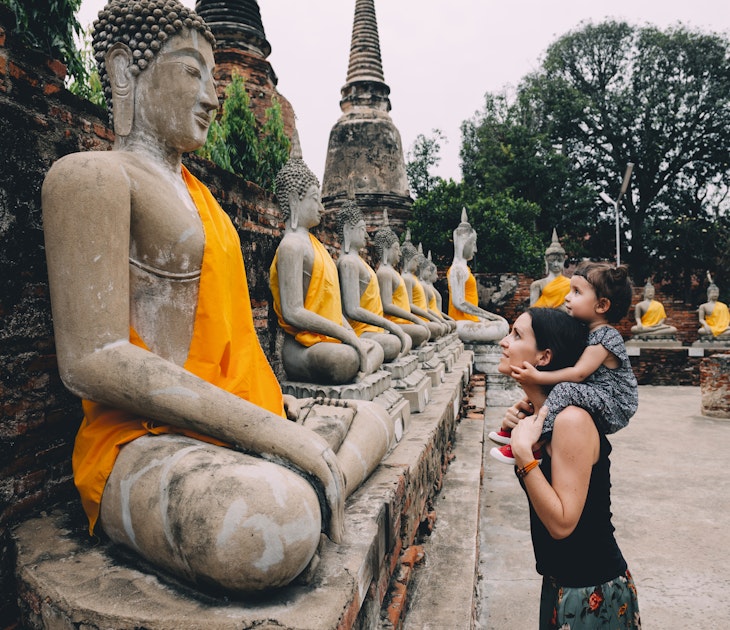
Tips & Advice
Jun 15, 2024 • 9 min read
Decide where to spend your time in Thailand with this guide to the best places to visit for beaches, wilderness, history, culture and vibrant cities.

Jun 15, 2024 • 17 min read

Apr 21, 2024 • 6 min read

Apr 16, 2024 • 12 min read

Apr 8, 2024 • 6 min read

Mar 14, 2024 • 10 min read

Feb 24, 2024 • 8 min read

Feb 23, 2024 • 7 min read

Feb 22, 2024 • 5 min read

Feb 3, 2024 • 7 min read

- Change to white mode
- Change to normal mode
- Change to text yellow mode

How to apply for a tourist visa in Thailand
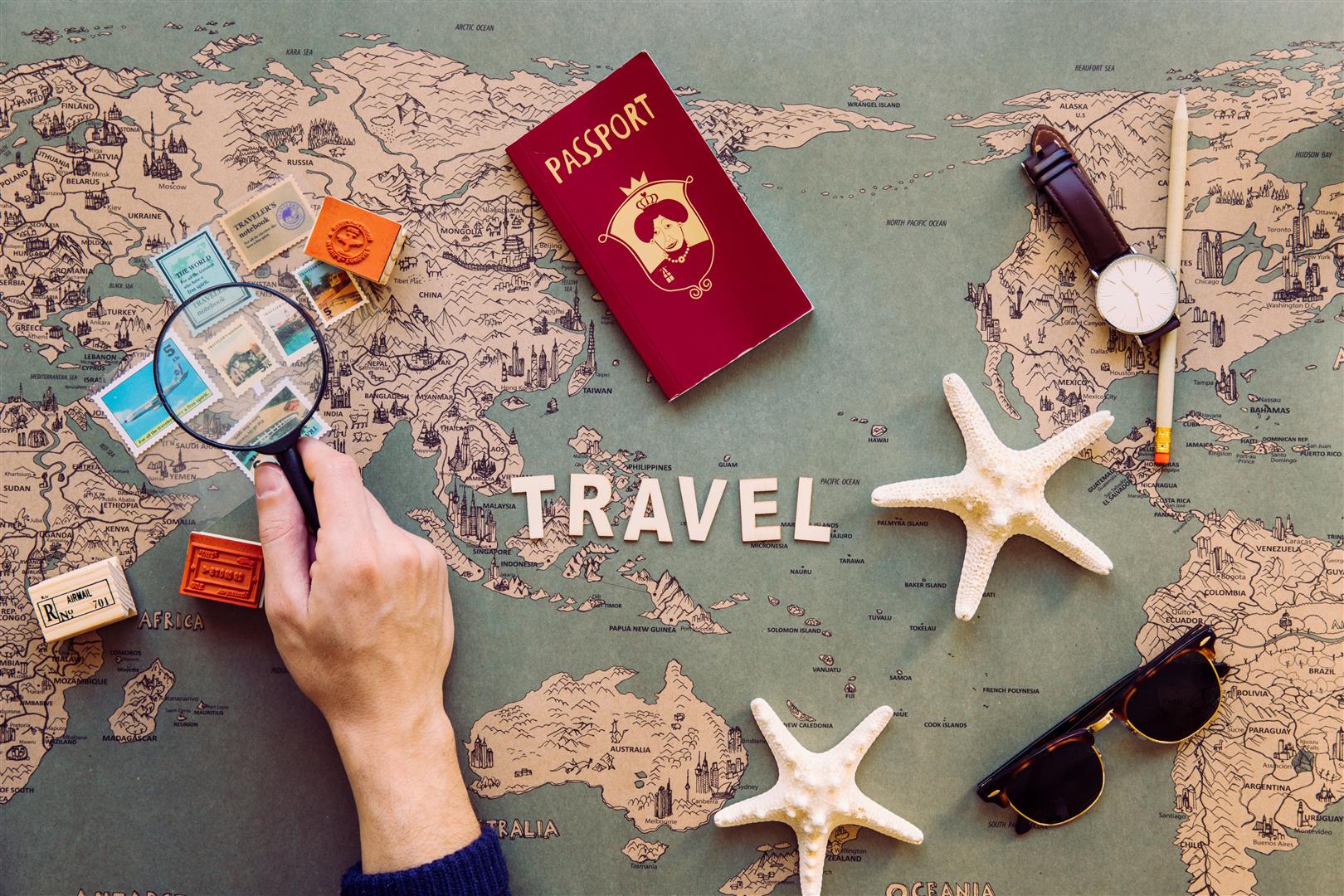
Thailand is one of the top destinations for tourists from around the world. There are major destinations that attract visitors in Bangkok, Phuket, Chiang Mai, and Hua Hin, to name only a few.
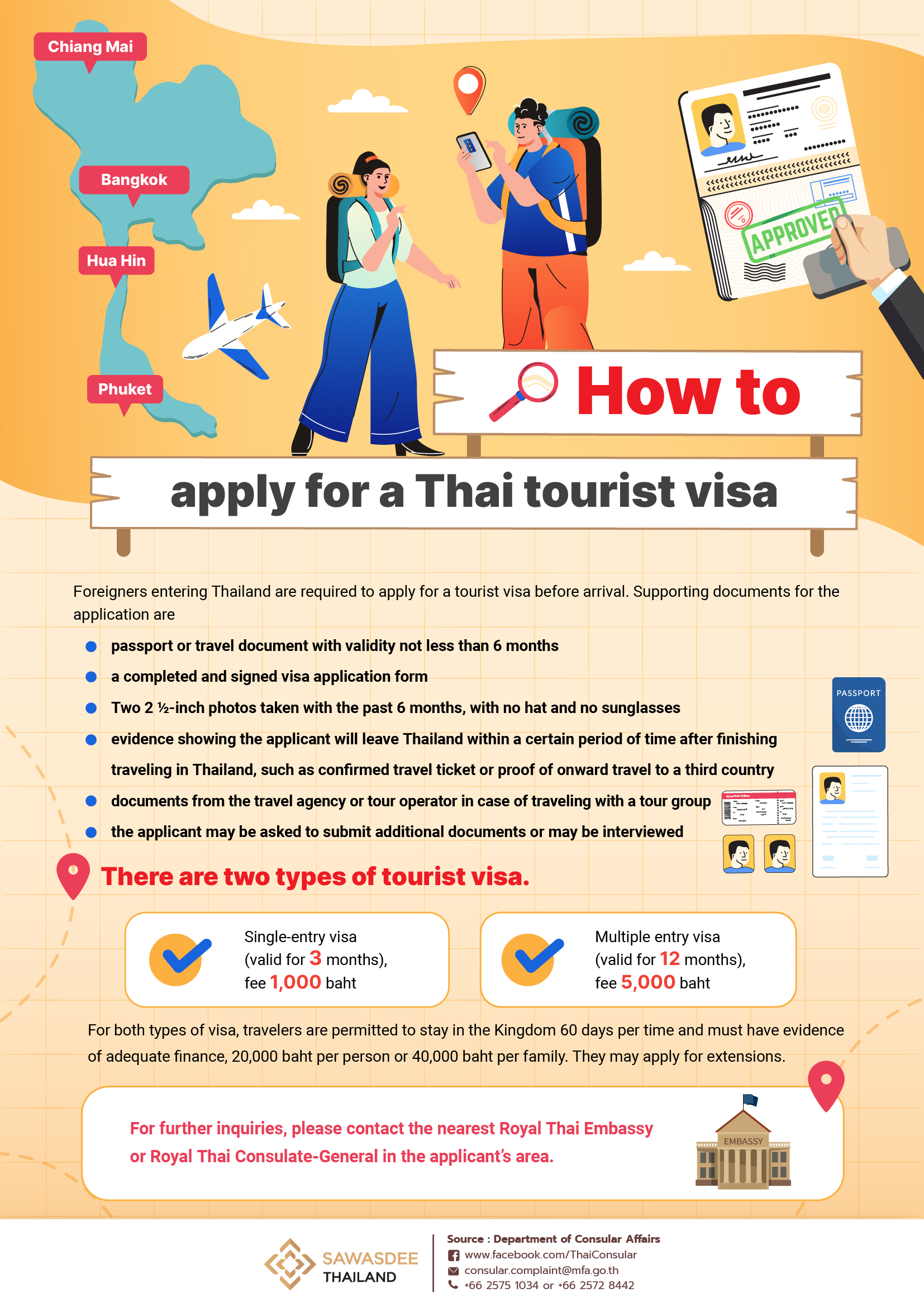
Foreigners entering Thailand are required to apply for a tourist visa. Supporting documents for the application are the following:
Passport or travel document with validity of not less than 6 months;
- A completed and signed visa application form
- Two 2½-inch photos taken with in the past 6 months, with no hat and no sunglasses;
- Evidence showing the applicant will leave Thailand within a certain period of time after finishing traveling in Thailand, such as a confirmed travel ticket or proof of onward travel to a third country;
- Documents from a travel agency or tour operator, in the case of traveling with a tour group;
- The applicant may be asked to submit additional documents or may be interviewed.
There are 2 types of tourist visa, namely single entry visa (valid for 3 months), with a fee of 1,000 baht, and multiple entry visa (valid for 12 months), with a fee of 5,000 baht. For both types of visa, upon arrival, travelers are permitted to stay in the Kingdom 60 days per time and must have evidence of adequate finances: 20,000 baht for an individual or 40,000 baht per family.
For further inquiries, applicants should please contact the nearest Royal Thai Embassy or Royal Thai Consulate-General in the their area.
Source : Ministry of Foreign Affairs Tel : +66 2203-5000
Most Popular
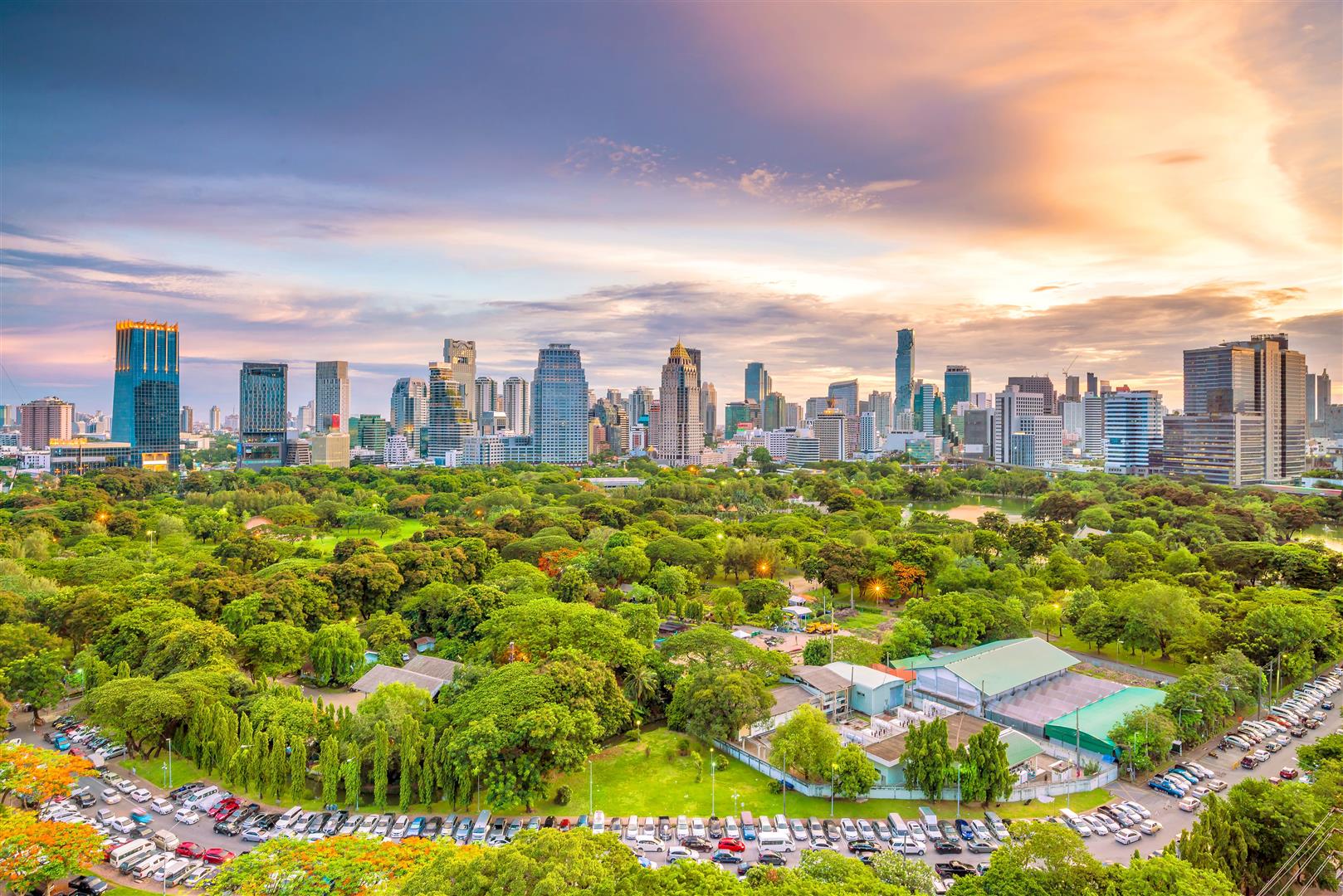
Bangkok Public Park Guide
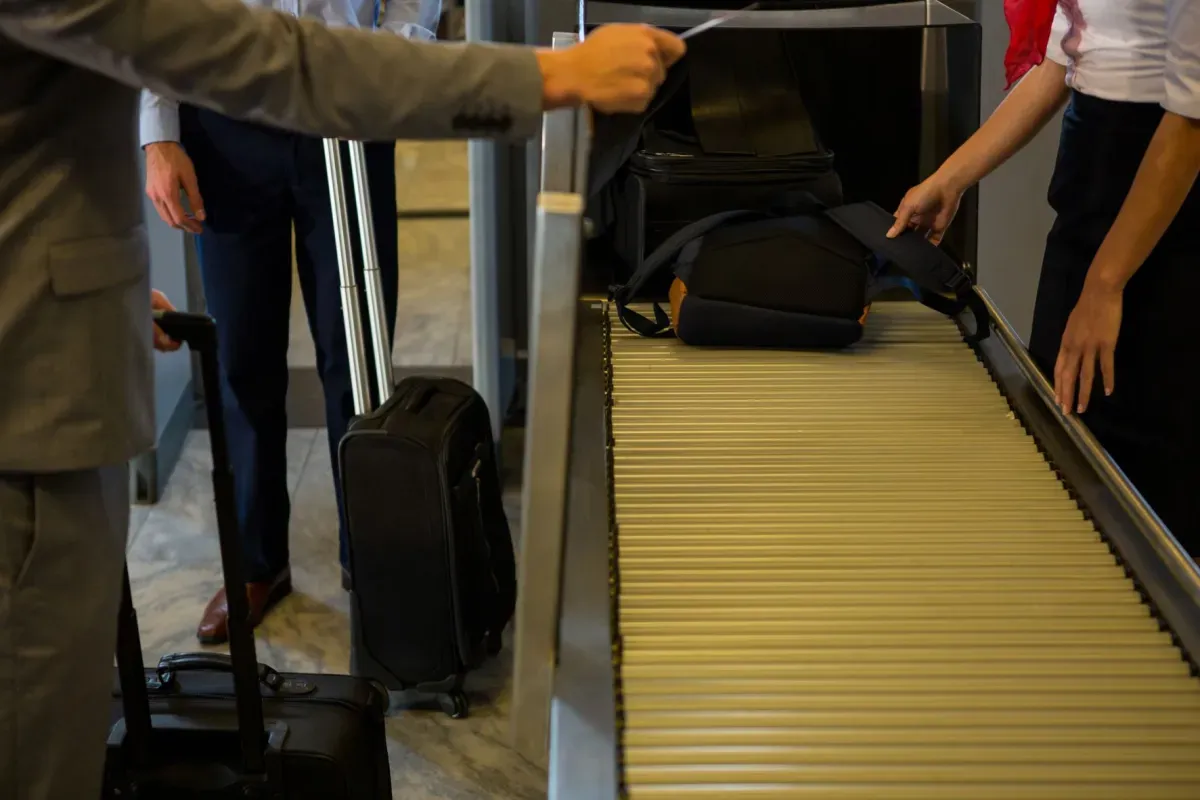
Kingdom of Thailand’s importing prohibited – restricted checklist items

Special Economic Zone (SEZ) Investment Guide
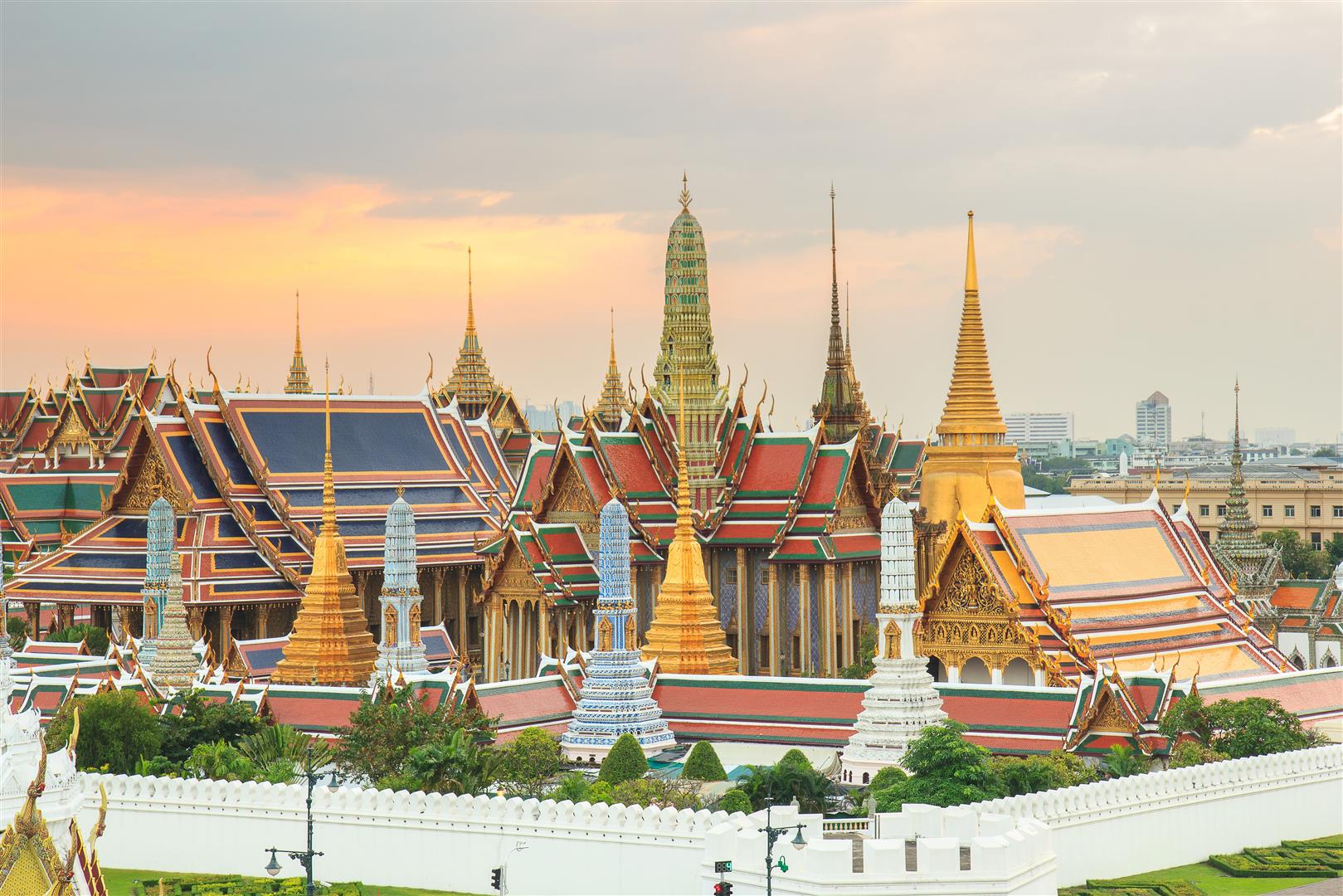
Bangkok Cultural and Nature Travel Guide

EEC Investment Guide
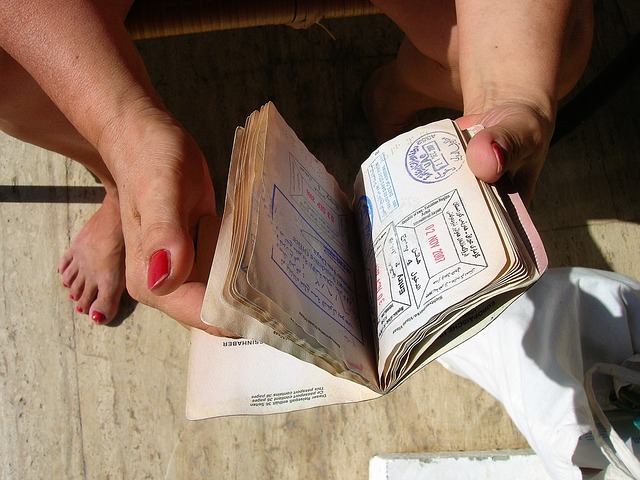
New Passport Guide
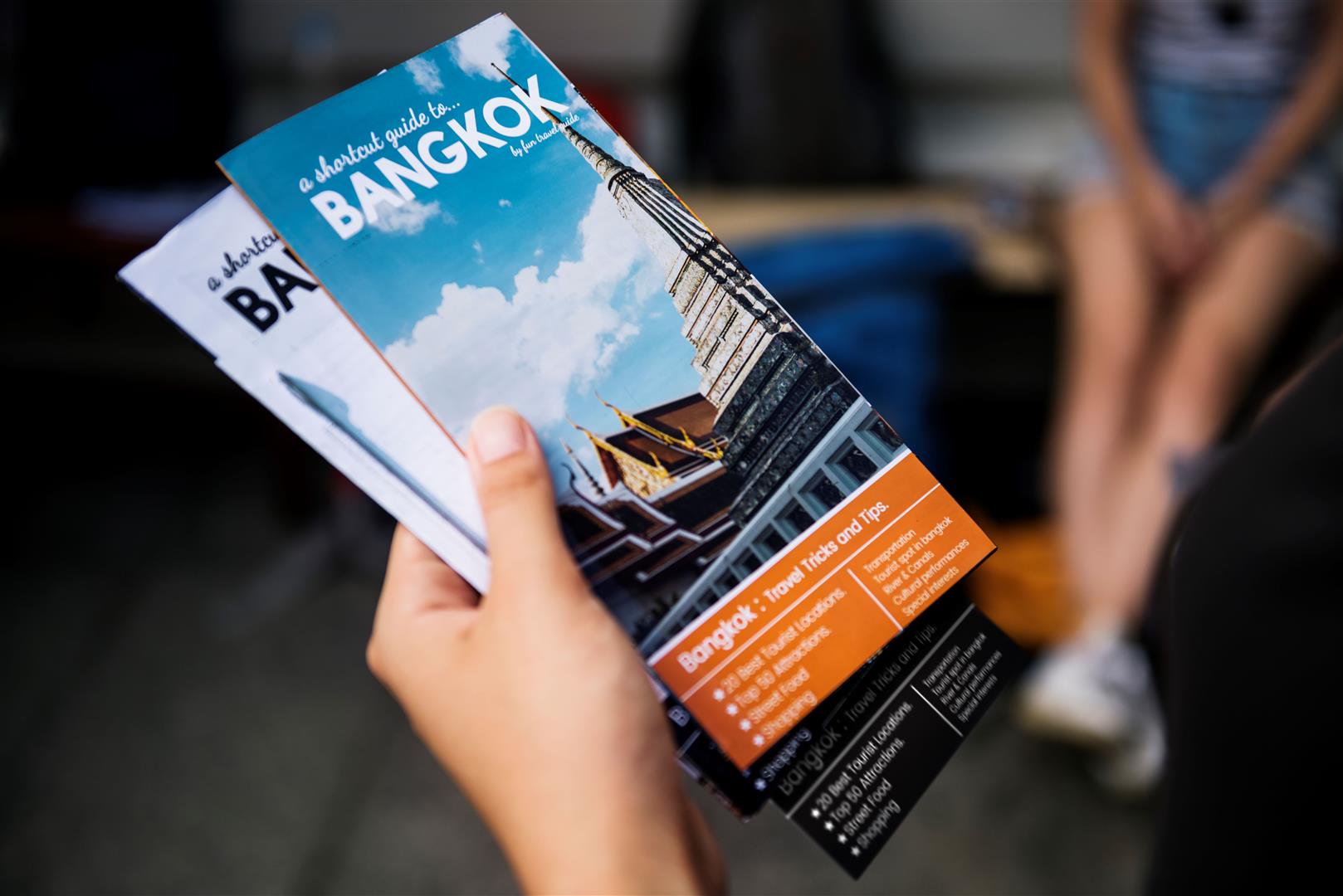
Guide for Dangers in the City That Tourists Should Be Aware Of

Thailand’s Multiple Entry Tourist Visa, Explained

Thailand is one of the most popular tourist destinations in the world, attracting millions of visitors each year. The country offers a wide variety of attractions, from tropical beaches and wild parties to ancient temples and bustling cities.
Many tourists who visit Thailand, however, mistakenly think that they can only stay for a short time on a tourist visa. While yes that’s true for the Single Entry Tourist Visa or Visa Exempt entry, there’s another option for those who want to stay longer in Thailand: the Multiple Entry Tourist Visa (METV) .
Everything You Need to Know About Thailand’s Multiple Entry Visa
What is a multiple entry tourist visa for thailand.
Unlike the normal Thailand Tourist Visa (TR) , which grants visitors 60 days of stay with a possible 30-day extension, the Multiple Entry Tourist Visa allows travelers to visit Thailand for up to 6 months (extendable to 9 months) with the ability to enter and exit the country as many times as they like.
What are the requirements for a Thailand multiple entry tourist visa?
First and foremost, to be eligible for the Multiple Entry Tourist Visa, you must be a citizen of an eligible country. A list of eligible countries can be found on the Thai Ministry of Foreign Affairs website.
In general, though, citizens of Western countries, including the United States, Canada, and EU countries, are eligible for the METV visa.
To apply for a Multiple Entry Tourist Visa, you will need to submit the following documents either online or in person at a Thai embassy or consulate:
- Passport with at least 6 months validity and a blank page for visa stamp
- Completed visa application form
- 2 passport-sized photos
- Proof of financial support (e.g. bank statement)
- Proof of onward travel (e.g. flight itinerary)
- Evidence of hotel reservations or evidence of a host in Thailand (e.g. invitation letter)
- Payment for the visa fee.
How long can I stay in Thailand with a multiple entry tourist visa?
The Multiple Entry Tourist Visa is valid for a period of 6 months. Unlike other tourist visas, that 6-month period starts when the visa is issued–not when you enter the country. Within the validity period, holders of the visa can enter and exit Thailand as many times as they want. Each stay, however, is limited to 60 days, but it can be extended for another 30 days at a Thai immigration office.
So, technically, the METV visa can last nearly 9 months. If the visa holder enters Thailand right before the 6 month validity period ends then he or she can stay 60 more days, and then extend that another 30 days at an immigration office.
So 6 months + 60 days + 30 days = nearly 9 months (if timed correctly).
How do I apply for the multiple entry tourist visa?
The process for applying for a Multiple Entry Tourist Visa is pretty straightforward. You can apply at the nearest Thai embassy or consulate in your home country or in another country if you already happen to be traveling. Or you have the option to apply online .
Make sure to check the website of your home country’s Thai embassy or consulate for specific instructions on how to apply for the METV (each can have different requirements).
It’s also important to submit your application at least a couple of weeks in advance of your intended arrival in Thailand, as processing times can vary depending on your embassy and the volume of applications they receive.
In general, though, most embassies can process a Multiple Entry Tourist Visa application in just a few days.
How much does a multiple entry tourist visa for Thailand cost?
The fee for a 6-month Multiple Entry Tourist Visa for Thailand varies depending on the country of the applicant. In general, though, the fee should be in the ballpark of 6,000 Thai baht ($200). Check with your nearest Thai embassy or consulate to see their specific fees.
METV visas can also be extended 30 days for an additional 1,900 baht ($60) but they can not be renewed. After the 6 months of validity runs out, the next time you leave Thailand you will have to apply for a new Thai tourist visa.
Always make sure you leave Thailand before your tourist visa expires so you don’t have to deal with visa overstay penalties .
Can I extend my multiple entry tourist visa in Thailand?
Yes, as we hinted at before, multiple entry tourist visas can be extended for 30 days each time you enter the country. So each time you enter you can stay up to 90 days if you extend.
Kick Off Your Next Thailand Adventure
Thailand’s Multiple Entry Tourist Visa is a great option for tourists who want to stay in the country longer than a normal tourist visa would allow.
Although it costs more, it gives travelers much more versatility in how they want to travel. They can enter and exit Thailand as they please (great when doing a larger Southeast Asia trip) and can stay for up to 9 months, which is a huge step up from the 90 days granted by the standard tourist visa.
All in all, the METV remains an awesome (albeit lesser-known) choice for travelers heading out to experience all the greatness Thailand has on offer.
Related: 15 Essential Thai Words to Know Before Your Next Thailand Adventure
Things to do ↗
Find the best activities, restaurants, and nightlife in Thailand.

Destinations ↗
Explore the endless destinations Thailand has to offer.
Stay in Thailand ↗
Learn how to extend your stay in the Land of Smiles.
Get personalized trip plans to Thailand that fit your budget and interests
Thailand explained.
Privacy Policy
Terms of Service

Affiliate Disclaimer: This article may contain affiliate links. We may earn a small commission if readers clicks through and make a purchase. See Affiliate Disclosure here.
60 Day Tourist Visa Thailand 2024 – All You Need To Know
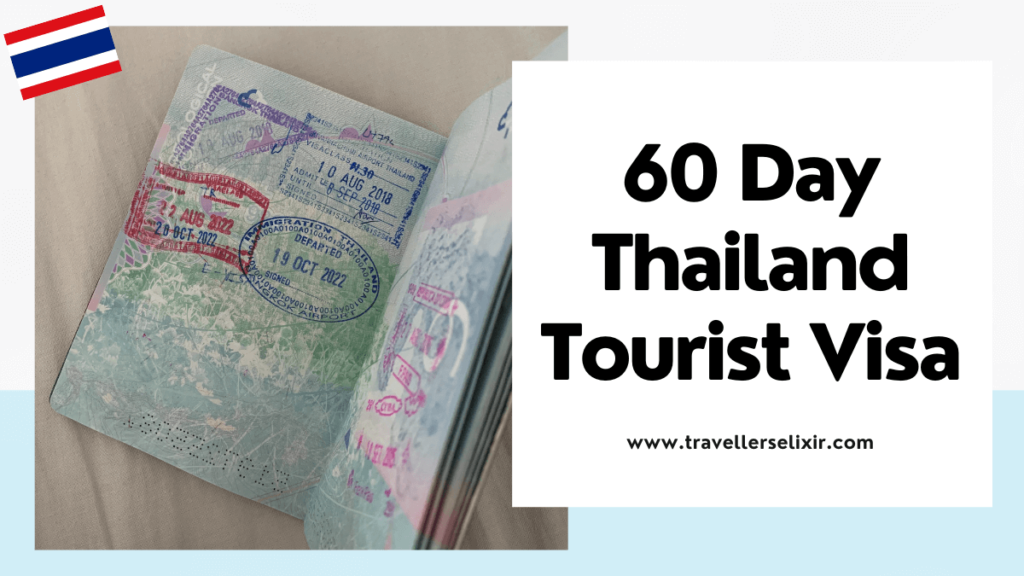
If you’re planning on visiting Thailand then you need to be sure of visa requirements.
Luckily, most people can enter Thailand for 30 days without a visa. However if you’re wanting to stay a little bit longer then you do have other options.
I’m a regular visitor to Thailand and I’ve applied for the tourist visa before so I know how it works.
In this guide, I’ll tell you everything you need to know about the 60 day tourist visa for Thailand including how to apply, how much it costs, how to extend it and more.
P.S. I update this page regularly to ensure the information is up to date. This page was updated for 2024.
Click For Table of Contents
30-day Tourist Visa Exemption
Passport holders of certain countries don’t need a visa when entering Thailand for tourism purposes and can stay in Thailand for a period of up to 30 days.
You’ll simply get a stamp in your passport and don’t have to pay anything.
Please note that between October 1 2022 and March 31 2023, the Thai government did extended this to 45 days in a bid to boost tourism following the pandemic but this has now reverted back to the original 30 days.
You can only use this scheme up to 2 times a year if you’re traveling by a land border and up to 6 times a year if you arrive at the airport.
Countries under this scheme include the USA, UK, Canada, Australia, New Zealand and most of Europe (see the full list here ).
There are currently 64 countries on this list so please check to see if your country is listed.
What You’ll Need:
Once you arrive in Thailand, head over to immigration.
Be sure to have the following documents:
- Proof of adequate finances for the duration of your stay – 10,000 baht per person or 20,000 baht per family. They rarely ask for this but have it prepared just in case.
- Proof of onward travel e.g. a plane ticket. A bus/train ticket should be fine but there have been reports of these being rejected. I was asked to prove this on my recent entry into Thailand.
- Proof of hotel or Airbnb stay . Again, I was also asked for this when I entered Thailand recently. I just showed a copy of my Airbnb confirmation and they accepted it.
If you are wanting to stay in Thailand longer than 30 days then you can apply for a visa.
There are 2 different tourist visas available that will give you 60 days in Thailand.
You do need to apply in advance. You’re not able to apply for either of them after you’ve entered Thailand.
Here’s a quick overview:
- SETV: single entry, 60 days only
- METV: multiple entry, 60 days each time
Single Entry Tourist Visa (SETV) – Overview
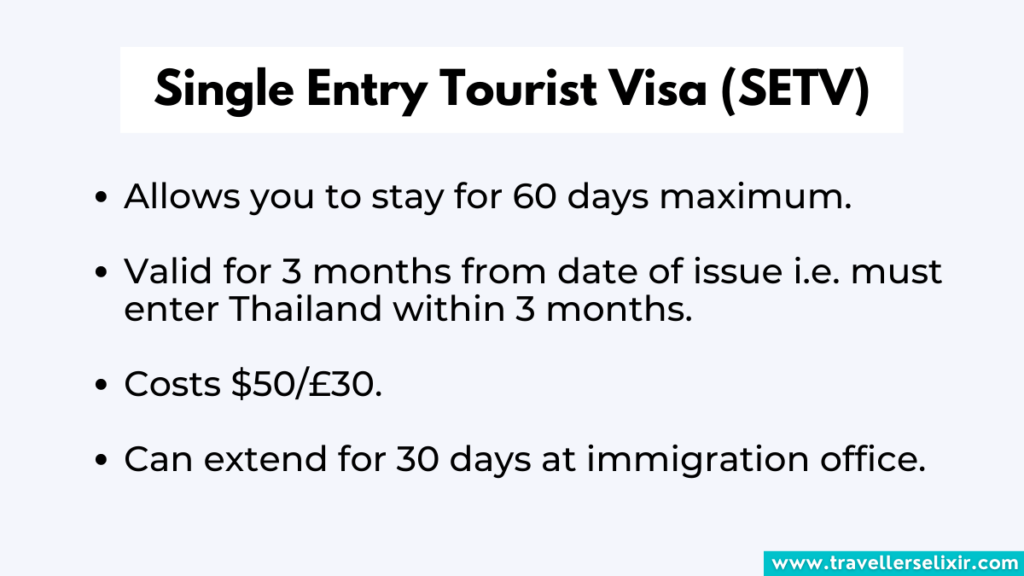
This visa will allow you to stay in Thailand for up to 60 days from the date of arrival.
This visa is valid for 3 months meaning once issued you must enter the country within 3 months else it will no longer be valid.
As it is a single entry visa, you can only enter the country once. Once you enter, you have 60 days before you need to leave.
You can apply for the single entry tourist visa in any country. I cover exactly how to apply for this visa below.
Multiple Entry Tourist Visa (METV) – Overview
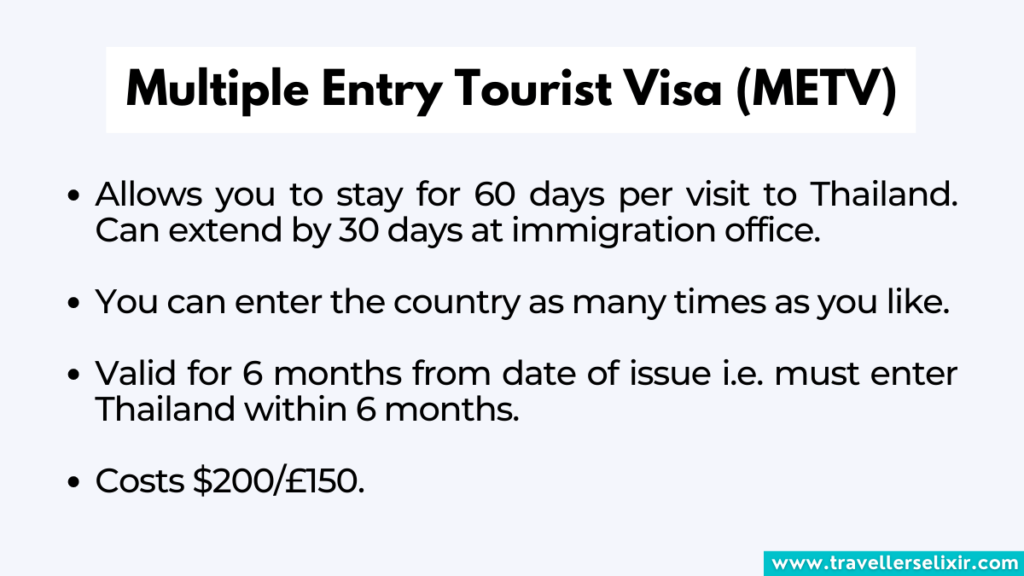
This visa is valid for 6 months from the date of issue.
As it is a multiple entry visa, this means that during the 6 months of validity, you can enter Thailand multiple times – you just can’t stay longer than 60 days on each visit.
So theoretically, every 60 days, you could just take a flight out of Thailand and come straight back to activate another 60 days.
You can only apply for a multiple entry tourist visa in your home country.
60 Day Tourist Visa Thailand Cost
Here’s how much the 60 day Thai tourist visas cost:
- Single Entry Tourist Visa (SETV) – $50 (£30)
- Multiple Entry Tourist Visa (METV) – $200 (£150)
How To Apply For 60 Day Thai Tourist Visa
If you’re planning on using the 30-day visa exemption scheme then you don’t need to apply for anything. You will be allowed entry upon arrival and they will simply stamp your passport.
To apply for the tourist visa (either SETV/METV), you can do this online on the Thai E-Visa website .
You should submit your application at least 15 working days before your planned travel date however most applications will be processed within a few days.
Mine took 4 working days to be approved.
You can also apply at the Thai Embassy in the country you’re in. You can check the directory here to find the closest to you.
What Do I Need To Apply For A Visa – Required Documents
Required documents:
- Passport/travel document valid for at least 6 months.
- Photograph of yourself taken within the last 6 months.
- Return or onward journey ticket e.g. plane ticket showing travel out of Thailand.
- Evidence of adequate finances – at least 20,000 baht per person/40,000 baht per family. A bank statement or pay slip should be fine.
- Proof of accommodation e.g. a hotel booking, Airbnb booking, letter of invitation from a family member.
- Confirmation of legal residence in your country e.g. a passport, driver’s license etc.
I actually applied for the SETV recently and was approved. I will say that the whole application process is really annoying and appears to be way more complicated than it needs to be.
The first thing to know is that the Thai visa website uses the same application form for every type of visa .
This includes the tourist visas, students visas, work visas etc so the form includes a lot of irrelevant questions that don’t apply to tourists but it asks you anyway.
As an example, it asked me for the identity of the person inviting me to stay in Thailand.
As a tourist, nobody was inviting me to stay in Thailand so I was super confused about what they wanted me to upload.
I emailed the Thai embassy to ask what I was supposed to submit but I never received a reply unfortunately.
In the end, I just uploaded a blank document that says ‘I’m applying for a tourist visa so nobody is inviting me to stay’ and it was accepted.

It’s really annoying that they don’t tailor the form to each individual visa because I’m sure this confuses so many people.
My advice is that if the question doesn’t seem relevant and you literally can’t answer it then just upload a blank document and write the reason why you can’t provide it. I did this and it was accepted.
Important Information
After you arrive in Thailand, ensure you carefully check the immigration stamp so you don’t overstay your visa. The stamp will state the day you have to leave by.
The day of arrival counts as a day i.e. if your visa is valid for 60 days, the day of arrival will be day 1.
If you overstay your visa then you’ll have to pay 500 baht per day as a fine and you might be banned from re-entering Thailand for up to 10 years.
Extending Your Tourist Visa In Thailand
If you want to stay longer than your visa allows then you do have the option to extend your visa for 30 days by going to an immigration office.
You can also now apply for a visa extension online but after it’s approved you’ll still need to go to the immigration office to get the stamp.
It costs 1,900 Baht (£45/$55) to extend your visa for 30 days. The extension is available for all visa types including the 30-day exemption, the SETV and the METV.
- If you have the 30-day exemption, your stay will be extended from 30 to 60 days.
- If you have the SETV/METV, your stay will be extended from 60 to 90 days.
All you need to do is fill in a few forms so it’s pretty easy but it regularly takes a few hours due to how busy the immigration office is.
You can only apply for this extension once per visit.
- Completed application form for extension (TM.7 form)
- Proof of onward travel from Thailand
- 2 passport photos taken within the last 6 months
There are immigration offices all over Thailand especially in the main tourist locations like Bangkok, Chiang Mai, Phuket, Krabi etc.
Check out this helpful map for the closest office to you.
Can I get a 90 day visa for Thailand?
There is no 90-day visa however if you want to stay for 90 days you can get one of the 60 day visas (either SETV or METV) and extend the visa for 30 days at an immigration office whilst in Thailand.
When do I need to leave?
Upon arrival your passport will be stamped with your arrival date and an expiry date.
Make sure you leave Thailand before midnight on the expiry date e.g. if your expiry date is the 9th August, you need to leave by 23.59 on the 9th August.
Can I apply for a visa in Thailand?
No, you cannot apply for a visa in Thailand. If you don’t have a visa when you arrive, you can get the 30 day visa exemption but cannot apply for the 60 day visa.
For the SETV, you can apply in any country outside of Thailand. For the METV, you need to apply in your home country.
Do I need to book an onward flight?
You may be asked for proof of onward travel when you arrive in Thailand. I was asked for this recently and had to show my plane ticket.
There have been some reports of people being denied entry if they have a bus, train or boat ticket rather than a plane ticket. It should be fine but I’d get a plane ticket to be safe.
To be honest, most of the time you won’t be asked for any proof but it is a possibility so it’s best to have something prepared or you could be denied entry.
A copy of your booking should be enough.
How can I apply for a Thai visa?
As mentioned above, you can apply online on the Thai E-Visa website . You can also apply in person at any Thai Embassy/Consulate.
Can I do a border run/visa run to get another visa exemption?
This used to be a really popular method of staying in Thailand. You could head to a nearby border, cross over and then cross back into Thailand activating another 30 day visa exemption.
Unfortunately, Thailand has cracked down on this and it is no longer possible. You can only enter Thailand on the 30 day visa exemption scheme twice a year via a land border.
You can still enter up to 6 times a year via an airport though.
If you have a METV, you can do a border run to re-activate your visa for another 60 days.
Can I be refused a visa extension?
Technically yes but this is very rare. If this does happen you will still get a 7 day extension. There are no appeals.
Can I extend my visa multiple times?
No, you can only extend your visa by 30 days once each time. If you leave the country and come back you could then extend it again.
Visa Exemption List
The below countries don’t need a visa to enter Thailand and can stay for 30 days. Exception: Cambodia and Myanmar can only stay for 14 days.
And that’s it!
Thanks for reading this guide on the 60-day tourist visa in Thailand.
I try to update this page as often as I can to ensure all the information is still up to date but I’d still recommend checking with your local Thai embassy to ensure you’re eligible.
If you’re planning a trip to Thailand then you might wanna check out my ultimate bucket list for Thailand which includes all of the top things to see and do.
Related Posts :

Where To See Turtles In Thailand – 2024 Guide

110+ Thailand Captions For Instagram – Puns, Quotes & Short Captions
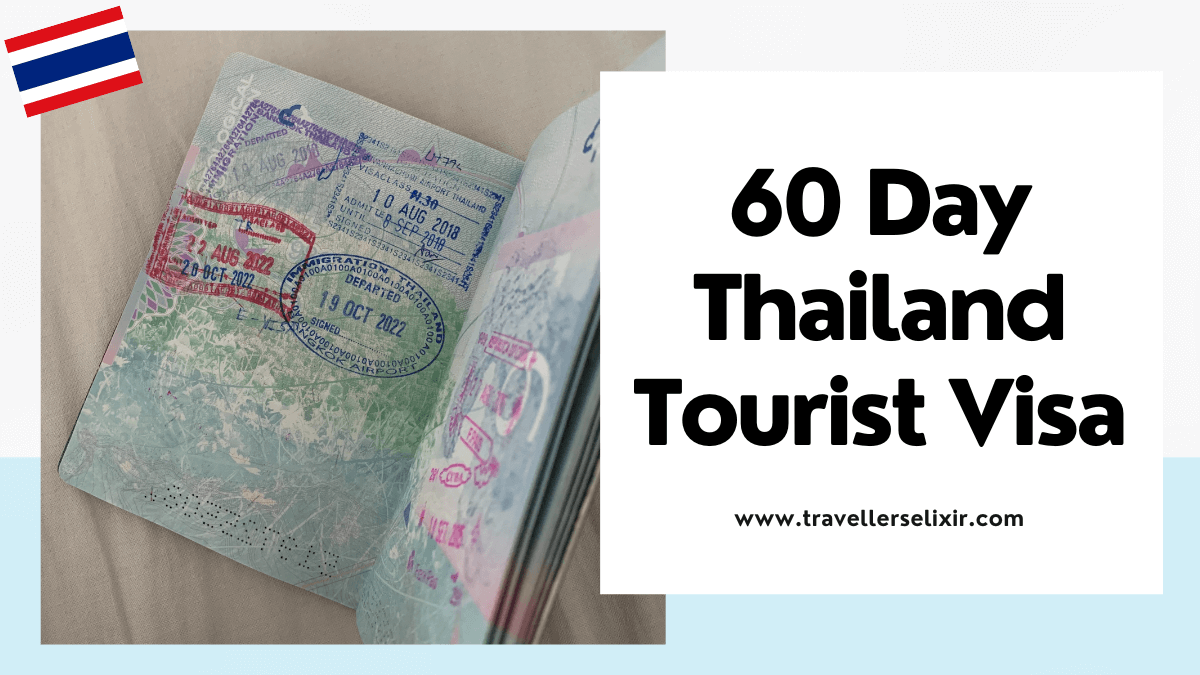
Ultimate Thailand Bucket List 2024: 23 Awesome Things To Do In Thailand
Learn more about the Traveller's Elixir Team .
- Follow NomadNumbers on Instagram
- Follow NomadNumbers on Pinterest
- Follow NomadNumbers on Twitter
- Follow NomadNumbers on Facebook
- Follow NomadNumbers on Youtube
- [email protected]
Thailand Tourist Visa Mastery: How to Stay for 3 Months
Published by mr. nomad numbers on january 26, 2024 january 26, 2024.
Thailand, with its lovely culture, stunning beaches, and delicious cuisine, continues to be a top destination for travelers worldwide, including ourselves (with our favorite destinations being Chiang Mai and Koh Samui for month-long stays). One month is simply not enough time for many nomads and slow travelers. In this detailed guide, we will go through how to stay in Thailand for 3 months on a tourist visa. We will go through all the types of tourist visas that are available and how to apply for them. We will also cover the visa extension process and share the recent online E-Extension Visa process.
Last update: January 2024
Type of Tourist Visas in Thailand
Visa exemption.
The Visa Exemption is a widely utilized option for tourists visiting Thailand, primarily because it requires only a passport valid for over 6 months upon entry, and best of all, it’s FREE! However, despite its convenience, this visa only permits a stay of up to 30 days. It’s imperative to verify if your nationality qualifies for this benefit before planning your trip.
As of October 2023, here are the 64 countries that are allowed to stay for 30 days in Thailand upon entering the country:
Note : Travelers from Korea, Brazil, Peru, Argentina, and Chile will receive permission to stay in Thailand for up to 90 days under the Tourist Visa Exemption Scheme.
Important : Passport holders who are not eligible to enter Thailand under the Tourist Visa Exemption Scheme or Visa on Arrival Scheme are required to get a tourist visa through a Royal Thai Embassy or Consulate prior to their visit.
Tourist Visa (TR)
The Tourist Visa (TR) is a great option for those planning a more extended stay in Thailand.
The Tourist Visa typically allows a stay of up to 60 days, which can be extended for an additional 30 days at the discretion of Thai immigration authorities for a total of 3 months. You can opt for either a single-entry or multiple-entry tourist visa, depending on your travel plans.
Single Entry Visa (SEV)
Single Entry Visa allows you to enter Thailand once and can be extended up to 3 months
- Validity: Usually valid for entering Thailand within 3 months from the date of issue.
- Duration: Once you enter Thailand, you can stay for up to 60 days.
- Extension: It’s possible to apply for an extension of stay for another 30 days at an immigration office in Thailand, making the total potential duration of stay up to 90 days.
Multiple Entry Visa (MEV)
Multiple Entry Visa allows you to enter Thailand as many time as you’d like over a 6 month period and can be extended up to 3 months per visit.
- Validity: Allows multiple entries into Thailand over a 6-month period from the date of issue.
- Duration: Each entry allows a 60 day stay, meaning you can come and go as many times as you want during the 6 month validity, but each stay can’t exceed 60 days.
- Extension: Like the Single-Entry Tourist Visa, each entry can potentially be extended for an additional 30 days at a Thai immigration office.
How to Apply
There is no application required for this visa if you qualify.
Keep in mind that you must provide the address of your hotel / airbnb once you enter the country . You might also be required to provide the following information:
- Proof of a return ticket exiting Thailand within 30 days
- Proof of funds of at least 10,000 THB for single travelers, or 20,000 THB per family during your stay in Thailand
Note: On the few Visa Exemption we got, we never had to provide a proof of return ticket or proof of funds as we entered by air through either Bangkok or Chiang Mai airports. Let us know if you had to provide these by leaving us a comment in the comments section below.
Tourist Visa (Single & Multiple Entry)
You need to apply for these visas at your local Thai Embassy!
Important: Do not try to apply for a Single or Multiple Entry Visa at an Thai Embassy outside of your country of residency, as you will likely get your visa declined.
You also need to apply within 3 months of your entry to Thailand, so don’t apply too early as well.
Documents Required
- Passport or travel document with an expiry date of no less than 6 months
- Visa application form (filled out)
- One recent 4 x 6 cm. photograph of the applicant
- Round-trip air ticket or e-ticket (paid in full)
- Proof of financial means (10,000 baht per person/20,000 baht per family) such as bank statement
- Proof of Hotel or private accommodation booking
30 USD Note: Fee is subject to change, so make sure to always double check with your local Thai Embassy!
Tips for the Thailand Tourist Visa Application
Here are our tips to ensure a smooth visa application process and approval
- Plan Ahead: Start the visa application process well in advance to avoid last-minute hassles. (You want usually to apply within 3 month of your entry to Thailand).
- Check Requirements: Review the specific requirements for your chosen visa type and ensure you have all necessary documents.
- Be Honest: Provide accurate information during the application process to prevent any complications later on.
- Stay Updated: Always double check the latest information on your local Thai Embassy website as these policy do change from time to time.
How to Extend your Visa
Once you have entered the country you can usually extend your stay for a final 30 days extension.
Online Application
Important: Thailand is rolling out an E-Extension Visa program that lets you apply for your extension online. We have not tried this yet as it was launched in early 2024. Feel free to check it out: Thailand Official E-Extension Website ( news related to this announcement)
We will update this post with our experience once we have the chance to try out this process. In the meantime if you were able to extend your Visa Except or Tourist Visa that way, we would love to hear from you. Please leave us a comment in the comment section below.
In-Person Application

Based on our multiple experiences in Chiang Mai (2019, 2022, 2023), here’s what the application process looks like:
- Head to the Immigration Bureau in the city of your stay. These bureaus are situated in major cities across the country, including Bangkok, Chiang Mai, and Phuket. (major locations listed below)
- Bring along the required documents & money (list provided below)
- Complete the requisite forms, readily available at the Immigration Bureau or downloadable online. People will check that these form are filled property before let you submit them at the office. Tip: download these forms (link below) and fill them out at home, as you will save a lot of precious time .
- Submit your application and pay the necessary fee.
- Wait for your extension to be processed (this could take between 30 minutes to a few hours based on how many people are applying)
- Retrieve your passport and updated visa. Once your extension request is approved, collect your passport and the new visa from the Immigration Bureau. Tip: Double-check the visa’s expiration date for accuracy.
Our tip: Plan to spend at least half a day doing this, and do it as soon as you can because your extension will be added to the last day you’re allowed to stay according to your latest visa stamp in your passport.
Required documents:
- Your passport
- The personal information page, showing your picture, name, expiry/issue date, etc.
- The page showing your Visa
- One passport-sized photo (4 x 6 cm)
- Form TM30 (should be filed by your landlord)
- 1,900 THB (in cash) to pay for the 30 days extension fee
Here are the forms you need to fill out:
- Form TM30 (note: there is an immigration app that your landlord should use to provide you with this form that will looks very different)
Major Immigration Offices in Thailand
- ChiangMai Immigration Office (Centra Festival Branch) Business Hours: 9am to 12pm – 1pm-5pm Monday to Friday
- Bangkok Immigration Office Business Hours: 8:30am to 12am – 1pm-5pm Monday to Friday
- Phuket Immigration Office Business Hours: 10am to 12pm – 1pm-3pm Monday to Friday
- Koh Samui Immigration Office Business Hours: 8:30am to 12am – 1pm-4:30pm Monday to Friday
Our Bottom Line
Navigating Thailand’s visa requirements doesn’t have to be daunting. By understanding the different types of tourist visas available and following the application guidelines diligently, you can set off on your Thai adventure with confidence and easily stay up to 3 months on a tourist visa in this wonderful country.
Whether you’re soaking up the sun on pristine beaches or exploring ancient temples, let your visa be the least of your worries as you immerse yourself in the wonders of Thailand.
For more information and updates on Thailand’s visa policies, visit the official website of the Royal Thai Embassy or consult with authorized visa agencies in your country. We suggest the following pages that should hopefully stay updated with the latest information:
- Visa Exemptions and Bilateral Agreements
- Tourist Visa For Thailand
- Thai Embassies Around The World
- Thai Immigration Forms
Planning a trip to Thailand? Check out our guides for some of the best places in Thailand: Chiang Mai , Mae Hong Son Loop , Koh Lanta , Koh Samui and Koh Tao . If you want to explore via motorbike, check out The Ultimate Guide to Obtaining a Thai Motorcycle License in Thailand .
Of course, feel free to leave us a comment in the comments section below if you have any questions for us as we will be happy to answer any we can based on our own experience.

Share this:
Mr. Nomad Numbers
We are a couple who travel the world and want to inspire people to think differently about the life they can design for themselves through our journey.
Kylie · January 29, 2024 at 1:16 pm
Thanks for sharing! Am I understanding correctly that on a Multiple Entry Visa you could possibly stay up to 6 months by:
1) Entering for the first time and being successful to extend stay by 30 days (total 90 days)
2) Leaving and entering a second time and being successful to extend stay by 30 days (total 90 days, cumulative 180 days)
Thanks! Kylie
Mr. Nomad Numbers · February 4, 2024 at 2:10 am
You are correct! Are you considering applying for a multiple entry visa?
Flipflops & Jandals · January 29, 2024 at 9:03 pm
Helpful info thanks as I have just been looking into this over the last week. Do you have recommendations or advice if we wanted to stay 3.5 months? And I keep seeing conflicting info on how many times in a year we can go back to Thailand – do you know the current restrictions?
Mr. Nomad Numbers · January 30, 2024 at 1:49 am
Hi Flipflops & Jandals.
I haven’t heard anything about doing more than 3 month in a single shot in Thailand at the moment on a tourist visa. You could consider a student visa for a year but you will need to make sure you take some classes (learning Thai being a very common on) that would get you 12 months stay in the country.
That being said visa run are quite common and most people will do these (with as little as 24 hrs between te-entry) to reset their visa clock. Though I heard story of people getting black listed from entering Thailand (for up to 5 years) from doing too many. So like with everything if you don’t abuse the system you should be fine.
Since you can get 3 months on a SEV why do you need 3.5? Could you get a MEV, spend a week outside of Thailand (probably less than that) and re-enter again for another 3 months?
The Ultimate Guide to Obtaining a Thai Motorcycle License in Thailand · June 3, 2024 at 5:33 am
[…] Hong Son Loop, Koh Lanta, Koh Samui and Koh Tao. If you need to extend your tourist visa, check out this guide on how to stay in Thailand for 3 […]
Leave a Reply Cancel reply

Your email address will not be published. Required fields are marked *
Notify me of follow-up comments by email.
Notify me of new posts by email.
Related Posts

Women’s packing list for nomadic long-term travel
We mentioned this already for Mr. NN’s Men’s packing list but it’s worth reiterating. As aspiring minimalists, we made the conscientious decision to live with less as it turns out that less is more. So when it came to packing our stuff, we decided that we would travel the world with carry-on only. Lets face it, women have different and more challenges packing than men do. We have more toiletries, makeup, products, bags and outfits than men do. And where are we supposed to put all of our shoes?

Men’s carry-on packing list for nomadic long-term travel
As aspiring minimalists, we made the conscientious decision to live with less as it turns out that less is more. So when it came to packing our stuff, we decided that we would travel the world with carry-on only.

Driving in Japan: What You Need to Know
Driving in Japan with a foreign license requires either an International Driving Permit or a JAF-translated license, depending on your country of origin. In this guide we give you an easy way to figure out how to make sure you can drive legally in Japan as a tourist
Enjoy our blog? Please help us spread the word :-)
- You pick the destination, we have all the visa information ready

- What is a Thailand Tourist Visa?
- Thailand Visa
Thailand is one of the first Asian countries to allow international visitors to visit, and it is slowly recovering, with new hotels advertising more extended stays for solo travelers. Thailand received 106,117 international tourists in the first ten months of 2021, a decrease from 6.7 million in 2020. Thailand received over 40 million visitors every year prior to the epidemic.
Based on their countries, foreign tourists who intend to visit Thailand for its picturesque sights, relaxation, or other recreational activities may need to get a Thailand Tourist Visa. A Thai Tourist Visa is only valid for a limited time and does not require the owner to engage in any type of remunerated activity.
Thailand has a lot to offer visitors, from archaeological sites and innumerable complex temples to quaint water markets, sophisticated cityscapes, and sandy beaches.
This essay aims to inform you about Thailand Tourist Visas, the right way to apply, their types, the requirements, fees, and much more.
Table of Contents
Who Needs a Thailand Tourist Visa?
You have to submit your application for a Thailand Tourist Visa if you do not meet the following criteria:
- You come from a country that is exempt from visa requirements.
- You qualify for a Thailand Visa on Arrival.
Note: Argentina, Brazil, Chile, South Korea, and Peruvian citizens can visit Thailand without a visa for up to 90 days. Several additional nations’ nationals are free from requiring a visa to enter Thailand for durations of up to 30 or 14 days.
Thailand Tourist Visa on Arrival
If you come from one of the countries below, you will not need to file for a Thailand Tourist Visa prior to visiting Thailand. The Thai Tourist Visa on Arrival is only authorized for 15 days. It must be used within that time frame; it cannot be extended. You can receive one upon arrival at one of the approved entry points:
Video description
Find the links and extra information explained on the video here:
Thailand e-Visa official website
Tourist visa online application form
Thailand tourist visa application, paper format
Register for the “Thailand Pass” at
List of exempted countries and visa on arrival ones.
What are the Types of Thailand Tourist Visas?
Thailand Tourist Visas are categorized into three types:
- Single-entry visa with a three-month validity period. Even if you haven’t used up all of your days, you won’t be able to re-enter the nation after leaving.
- Many-entry visa, valid for six months, allows the owner to depart and re-enter the country more than once within the visa’s validity period.
- Thailand Tourist Visa On Arrival is only available to nationals of selected countries for a term of 15 days that cannot be extended.
How can You Apply for a Thailand Tourist Visa?
You must request a Thailand Tourist Visa at one of Thailand’s embassies overseas. The following is the application procedure:
- Contact the Thai Embassy or Consulate nearest to you. Find out their working days, opening hours, and how to pay the Thai visa fee if you need one.
- Gather all the necessary papers for a Thailand Tourist Visa.
- By mail. In this case, you must include a pre-paid and self-addressed envelope.
- Wait for the visa application process to be over.
- Gather your passport and visa. They would be returned back to you if you applied via mail.
- If your Thai Tourist Visa is issued, you must enter Thailand within the time frame specified on your visa, or else your visa will expire.
How Long Does a Thailand Tourist Visa Take to Process?
The period process for a Thai Tourist Visa application is determined by the embassy where you apply. It might take from 7 to 10 business days to process your application after it is received, while some diplomatic missions promise to grant visas as soon as two working days after receipt.
However, since there is no specific time limit, you must apply at least a couple of weeks before the day you expect to go. Consider the amount of time it takes for your paperwork to be mailed to the Thai embassy and returned to you if you submit your application by mail.
Thai Tourist Visa Application Required Documents
Applying for a Thailand Tourist visa requires you to have a number of documents to back up your application. The required documents include the following:
- A passport that is valid for at least six more months and contains at least two blank visa pages.
- Make a photo of your passport information page.
- A Thai Visa Application Form that has been filled and signed.
- A confirmed return flight ticket demonstrating your intent to depart the country when your visa expires.
- 3.5 cm x 4.5 cm
- White background
- Not older than six months
- Taken with a neutral facial expression
- Fully visible face
- Only religious headgears are allowed.
- Glasses are allowed with no heavy frames.
- Evidence of adequate capital resources to support the period of your stay, including bank statements from the previous six months
- Evidence of accommodation in Thailand, such as a hotel reservation or a letter of invitation from a family member or a friend.
- Some payment evidence for the Thai Visa cost.
- If you are meeting relatives or friends in Thailand, you must provide proof of your relationship.
- An invitation letter
- If you are hired, a letter from your company or employer.
- Entrepreneurs or self-employed people will need a self-assessment form and your company’s registration paperwork.
- A student will need a letter from your school.
- Your documents proving the need for multiple entry visas
Note: The Thai embassy where you apply may request any extra documentation they deem necessary. The documentation will also differ depending on the reason for your trip. Documents that are not written in English must be translated and authorized.
How Much is the Thailand Tourist Visa Fee?
A Thailand visa fee varies based on the nation from which you apply and the national currency. But, as a reasonable approximation, the Thai Tourist Visa costs
- Single-entry visas: $30 to $50
- Multiple-entry visas: $150 to $250
Furthermore, depending on the rules of the Thai embassy through which you apply, you may be required to pay in cash at the time of application or by bank transfer.
How Long is a Thailand Tourist Visa?
A Thailand Tourist Visa is valid for the following period of time:
- A single-entry Thailand Tourist Visa: Three months of validity for a single-entry visa. Within three months, visitors can remain in the country for up to 60 days. If you leave, you will not be able to return, even if you have not spent the maximum number of days.
- A multiple-entry Thailand Tourist Visa: It is valid for six months. During this period, you can enter numerous times for a total of sixty days.
- A Thai visa on arrival is valid for up to 15 days.
Can I Extend a Thailand Tourist Visa?
Unless you obtain a Thai Visa On Arrival, you can extend your tourist visa. If you are in Thailand on a standard Tourist Visa and wish to remain further than the visa allows, you can request an extension at the Thailand Immigration Bureau in Bangkok. You must do it before the visa expires. Extensions are granted for up to 30 days. However, the final decision is made by Immigration Officers. You will need the papers below to apply for an extension:
- Your passport must be valid.
- Copies of the passport information page, your valid Thai visa, and the entrance and departure stamps
- There are two ways to apply for an extension of your Thai visa: online or at the Thai office of immigration.
- Adequate cash to cover the Thai visa extension charge (close to $62)
- One passport-sized photo.
- Thai visas on arrival, which are only valid for 15 days, are not subject to extensions. If you want to remain for more than 15 days, you must get a standard Thai Tourist Visa.
What Happens If You Overstay a Thailand Tourist Visa?
You will be punished if you decide to stay on your Thai tourist visa for more than you were supposed to. Overstaying for 40 days or more can result in fines of up to 20,000 Thai Baht per day.
When you overstay your visa for more than 90 days, you will be deported and restricted from reentry for a period of time (from 1 to 10 years, depending on how much you overstayed).
Can You Work With a Thailand Tourist Visa?
No, a Thai Tourist Visa does not grant the applicant the right to work. Any foreigner wishing to get hired or do business in Thailand must get a Non-Immigrant Visa type “B.” Furthermore, if you wish to work for a living, you must get a Thailand Work Permit, which your employer must secure on your behalf.
Let’s Sum Up…
Thailand’s exotic locations attract millions of tourists annually. Therefore, the Thia government grants tourist visas to foreign travelers in order to boost its tourism industry. Although a tourist visa is limited, it is subject to extension.
This article covered everything you need to know about Thai tourist visas, including the requirements, how to apply, processing time, and fees.
On the Visa Library website, you can learn about other Thailand visas as well as Thailand insurances. If you have any questions, write them in the comment section. The visa library team will answer your questions right away.
How useful was this article?
Click on a star to rate it!
Average rating 5 / 5. Vote count: 2
No votes so far! Be the first to rate this article.
Cookies on GOV.UK
We use some essential cookies to make this website work.
We’d like to set additional cookies to understand how you use GOV.UK, remember your settings and improve government services.
We also use cookies set by other sites to help us deliver content from their services.
You have accepted additional cookies. You can change your cookie settings at any time.
You have rejected additional cookies. You can change your cookie settings at any time.
Bring photo ID to vote Check what photo ID you'll need to vote in person in the General Election on 4 July.
- Passports, travel and living abroad
- Travel abroad
- Foreign travel advice
Entry requirements
This advice reflects the UK government’s understanding of current rules for people travelling on a full ‘British citizen’ passport from the UK, for the most common types of travel.
The authorities in Thailand set and enforce entry rules. If you’re not sure how these requirements apply to you, contact the Royal Thai Embassy in the UK.
COVID-19 rules
Countries may restrict travel or bring in rules at short notice. Check with your travel company or airline for changes.
If you test positive for COVID-19, you may need to stay where you are until you test negative. You may also need to seek treatment there.
You should also read TravelHealthPro’s general COVID-19 advice for travellers .
Travel to Thailand
If you are visiting Thailand and then travelling to a country that requires an RT-PCR test for entry, you will need to buy medical insurance that covers COVID-19 treatment before you arrive in Thailand.
Passport validity requirements
Your passport must be valid for at least 6 months from when you enter Thailand.
You could be refused entry to Thailand if your passport is damaged or has pages missing.
If you’re a dual national, to avoid problems at immigration, you must leave Thailand on the same passport you used to enter.
If you need to renew or apply for a new British passport, see overseas British passport applications .
Visa requirements
British passport holders arriving by air or land can enter Thailand without a visa (visa exemption) for the purpose of tourism for a period not exceeding 30 days.
If you intend to stay longer (for work, study or other reasons) you need a visa before you travel.
For more information on visas or entry requirements, contact the Royal Thai Embassy or local Immigration Office.
Overstaying your visa
If you stay beyond the period of your visa, you will be fined 500 Thai baht a day up to a maximum of 20,000 baht. You risk being:
- held in detention
- deported at your own expense
- banned from re-entering Thailand for up to 10 years
Conditions in detention centres can be harsh.
Vaccination requirements (other than COVID-19)
At least 8 weeks before your trip, check the vaccinations and certificates you need on TravelHealthPro .
Depending on your circumstances, this may include a yellow fever vaccination certificate.
Customs rules
There are strict rules about goods that can be brought into and taken out of Thailand . You must declare anything that may be prohibited or subject to tax or duty.
Importing cigarettes
It is illegal to import more than 200 cigarettes per person into Thailand. This is enforced at customs on arrival. If you go over the limit, you could be fined 10 times the value. Your cigarettes will likely be confiscated.
Related content
Is this page useful.
- Yes this page is useful
- No this page is not useful
Help us improve GOV.UK
Don’t include personal or financial information like your National Insurance number or credit card details.
To help us improve GOV.UK, we’d like to know more about your visit today. Please fill in this survey (opens in a new tab) .

Report this post
Do you want to report "How much bank balance required for Thailand tourist visa?"
How much bank balance required for Thailand tourist visa?

Click to see more content like this in the Tourist visas for thailand Category
Planning a trip to Thailand and wondering about the required bank balance for a tourist visa? Discover the financial requirements and related information for a smooth application process. Read more to get the answers.
Are you planning a trip to the beautiful country of Thailand? That's great! But before you pack your bags and jump on a plane, it's important to make sure you have all the necessary paperwork, including a tourist visa. One of the key requirements for obtaining a Thailand tourist visa is having enough money in your bank account. So, how much bank balance do you need? Let's find out!
What is a Thailand Tourist Visa?
A Thailand tourist visa is a special kind of permit that allows you to enter the country for a short period of time for leisure and vacation purposes. It's important to get a tourist visa before you travel to Thailand, as it's required by the Thai government for visitors from many countries.
Bank Balance Requirement for Thailand Tourist Visa
The Thai government wants to make sure that visitors have enough money to cover their expenses while they are in the country. This is why they ask for a certain amount of bank balance when you apply for a tourist visa. The exact amount required can vary depending on your situation and the type of visa you are applying for. However, as a general rule, you should have at least 20,000 Thai Baht (around 600 US Dollars) in your bank account if you are traveling alone, or 40,000 Thai Baht (around 1,200 US Dollars) if you are traveling with your family.
How to Show Your Bank Balance
To prove that you have the required bank balance, you will need to provide some documents when you apply for your visa. The most common document is a bank statement that shows your account balance and transactions for the past six months. Make sure that your bank statement has your name and address on it, and is issued by the bank where you have your account. Sometimes, the Thai embassy or consulate may also ask for additional documents, like a letter from your bank confirming your account balance.
Tips for a Successful Thailand Tourist Visa Application
- Make sure you have all the required documents, including your passport, visa application form, recent passport-sized photos, and bank statement. Double-check that all the information is correct and up-to-date.
- Apply for your visa well in advance of your trip, as the processing time can take several weeks. This will give you enough time to deal with any issues that may come up during the application process.
- Be prepared to pay the visa fee, which can vary depending on your nationality and the type of visa you are applying for. Make sure you have the correct amount in the required currency.
- Follow all the guidelines and requirements of the Thai embassy or consulate where you are applying for your visa. This will increase your chances of getting your application approved without any problems.
Planning a trip to Thailand can be exciting, but it's important to make sure you have all the necessary paperwork and meet the requirements for a tourist visa. If you need help or have any questions about coming to Thailand, feel free to contact us for a consultation. We're here to help make your dream vacation a reality!

Tourist Visas for Thailand
Questions and answers for Tourist visas to Thailand
India Introduces Free 30-Day e-Tourist Visa for Thai Passport Holders

In a significant move to boost tourism, the Government of India has announced a visa fee exemption scheme for Thai passport holders. According to a press release issued by the Embassy of India in Bangkok, Thailand, the exemption applies to e-Tourist visas and will be effective from July 1 to December 31, 2024. This initiative aims to strengthen tourism ties between India and Thailand, encouraging more Thai tourists to explore the rich cultural and historical tapestry of India.
Table of Contents
Details of the Visa Fee Exemption Scheme
The new scheme allows Thai tourists to visit India for up to 30 days with double entry, all without paying any visa fees. While the visa fees are waived, travelers must still apply for an e-Tourist visa in advance through the designated website: Indian e-Visa .
Benefits of the Scheme
- Enhanced Tourism : This initiative is expected to significantly boost the number of Thai tourists visiting India, fostering stronger cultural and economic ties between the two nations.
- Double Entry : The visa allows for double entry, offering greater flexibility for tourists planning to explore different regions of India within a 30-day period.
- Cost Savings : Waiving the visa fee makes traveling to India more affordable for Thai tourists, encouraging longer stays and more in-depth exploration.
Encouraging Exploration and Cultural Exchange
This visa fee exemption is part of India’s broader strategy to enhance its tourism sector by making it easier and more attractive for international visitors. India offers a myriad of experiences, from its bustling cities to its serene landscapes, ancient temples, and vibrant markets.
For those planning a trip, consider exploring some of the best destinations India has to offer:
- Delhi : The capital city, rich in history and home to landmarks such as the Red Fort, India Gate, and Qutub Minar.
- Agra : Visit the iconic Taj Mahal, a UNESCO World Heritage site and one of the Seven Wonders of the World.
- Jaipur : Known as the Pink City, Jaipur boasts magnificent palaces and forts, including the Amber Fort and City Palace.
For more travel inspiration, check out Top Places to Visit in India and Best Historical Places in Chennai .
How to Apply for the e-Tourist Visa
Despite the fee exemption, Thai travelers need to follow the standard procedure for obtaining an e-Tourist visa. The application process involves:
- Online Application : Complete the visa application form online at Indian e-Visa .
- Upload Documents : Provide necessary documents, including a scanned copy of the passport and a recent photograph.
- Approval : Once approved, the e-Visa will be emailed to the applicant. This should be printed and presented upon arrival in India.
For more information on traveling to India, including detailed travel itineraries, visit Chennai Tours and South India Tour from Chennai .
India’s decision to offer a free 30-day e-Tourist visa for Thai passport holders underscores its commitment to fostering international tourism and cultural exchange. This initiative not only simplifies the travel process but also makes it more accessible and affordable for Thai tourists to experience the diverse beauty and heritage of India. Whether exploring historical sites, enjoying the vibrant markets, or immersing in the local culture, Thai tourists are in for an unforgettable journey through India.
For a seamless travel experience and more detailed travel plans, visit Chennai Tours and South India Tour from Chennai .
When does the visa fee exemption scheme start and end?
The scheme starts on July 1, 2024, and ends on December 31, 2024.
How long can Thai tourists stay in India under this scheme?
Thai tourists can stay in India for up to 30 days with double entry.
Is there any cost for applying for the e-Tourist visa?
No, the visa fee is waived, but travelers must still apply for the e-Tourist visa online.
Where can Thai tourists apply for the e-Tourist visa?
They can apply at the official website: Indian e-Visa .
What documents are required for the e-Tourist visa application?
Required documents include a scanned copy of the passport and a recent photograph.
Can Thai tourists enter India multiple times with this visa?
Yes, the visa allows for double entry within the 30-day period.
Where can I find more travel information and itineraries for India?
Visit Chennai Tours and South India Tour from Chennai for detailed travel plans and itineraries.
About The Author
Tusk Travel Team
Related posts.

Maldives Found 96.4% Growth in Indian Travelers

The Winning of PATA Gold Award 2019 by Incredible India Campaign
Leave a comment cancel reply.
Your email address will not be published. Required fields are marked *
Save my name, email, and website in this browser for the next time I comment.

Thailand Launches New Digital Nomad Visa
W ith more people working remotely in a post-pandemic world, numerous countries are rethinking how to appeal to and attract global workers. In recent months, Türkiye , Canada , Italy , and Japan have all rolled out digital nomad visas, inviting travelers who work remotely to live within their borders for six months to a year. Not to be left out, Thailand not only announced a similar visa scheme-but also upped the ante.
On May 30, the Southeast Asia nation unveiled a splashy new digital-nomad visa program that will allow remote workers to stay in the country, working from buzzy coworking spaces in Bangkok or beach cafés in Koh Samui, for up to five years. And unlike other visa programs, it extends to people interested in long-term cultural immersion in the country. According to the official announcement, "The effective date of the new measures will be announced upon the completion of final legal procedures."
Called the Destination Thailand Visa (DTV), it's aimed at "digital nomads, remote workers, and freelancers, as well as those who want to learn muay Thai [boxing] and Thai cuisine," Chai Wacharonke, Thailand's foreign ministry spokesman, said during a press conference announcing the visa program in May.
Applicants must be at least 20 years old and either be self-employed or work for a business outside Thailand. The application fee for the visa is 10,000 Thai baht (about US$272 based on current conversion rates).
There is currently no specified minimum income, a common requirement for remote worker visas (for example, Spain requires $2,800 a month and Iceland demands roughly $7,700 a month). The Destination Thailand Visa is a big departure from Thailand's Long-Term Residence Visa , previously the only way to stay in the country for a prolonged period, which required a $1,600 visa fee and proof that the applicant made at least $80,000 a year, among other significant financial hurdles. Those who are approved for the new digital nomad visa are welcome to bring their spouse and children, who are not required to get a visa of their own.
Once the visa is live, people interested can apply online through the official Thai e-visa website (an option only available to some nationalities, the United States being one of them) or by making a visa appointment at a Thai consulate or embassy.
While the visa allows you to stay in the country for up to five years, there is one unique stipulation you may want to consider before submitting an application. Destination Thailand Visa holders are required to leave and reenter the country every 180 days, and they have to pay the visa fee again each time.
Thailand has long been popular with digital nomads (even though they could previously stay a maximum of 60 days on a tourist visa and technically weren't supposed to work there) and expats-the country recently ranked as one of the top countries in the world for expats -due to the low cost of living, the cuisine, the friendliness, and the ease of finding good, affordable housing. Additionally, it is one of the countries in the world where the American dollar goes furthest for travelers .
However, there's a chance the Land of Smiles will be more in demand in the coming years, in part due to the popularity of the HBO anthology miniseries The White Lotus , which will see its third season, tentatively scheduled for release in 2025, based in Thailand . The first two seasons resulted in such an influx of travelers to the filming locations, Hawaii and Sicily, that it became known as " The White Lotus Effect ."

Money blog: Nike to roll out cheaper trainers; NatWest and Lloyds hikes some account fees
Welcome to the Money blog, your place for personal finance and consumer news and tips. Leave a comment on any of the stories we're covering below.
Tuesday 2 July 2024 06:25, UK
- Nike to roll out cheaper trainers in bid to boost sales
- Morrisons and Heinz team up to offer free meals
- NatWest and Lloyds hike fees for some current accounts
- Energy price cap falls today - here's what you need to know
Essential reads
- Thinking about switching? These are the cheapest energy tariffs available right now
- Basically... What is income tax?
- Money Problem : 'I hired a car via EasyJet but they are directing my complaint to someone else - what can I do?'
- How to split housework fairly with your partner
- Best of the Money blog - an archive
Ask a question or make a comment
Morrisons is offering shoppers a free jacket potato with Heinz Cheesy Beanz for the next fortnight.
The supermarket chain has joined forces with Heinz to bring back the popular "ask for Henry" initiative which began in 2022 to help people with financial costs during the cost of living crisis.
The complimentary dish is available every day at Morrisons cafes across the country and allows a customer one free jacket potato and beans per day.
There is also no minimum spend required.
But customers will need to use the discrete phrase "ask for Henry" in order to receive it.
The offer ends on 14 July.
Nike plans to launch a cheaper trainer line in an effort to boost sales.
The sporting company's new range will be priced at around £79 or less and will be available in stores across the world, according to Reuters.
Nike has seen sales growth slow as it battles competition from Adidas, as well as the likes of On and Deckers' Hoka brand.
Last Thursday the company reported a sales decline in its latest quarter.
Nike shares also slumped last Friday, ending the day down 19.98%, the biggest one-day percentage drop in the stock's history.
"This is likely a bid to secure some more price-sensitive consumers," GlobalData analyst Neil Saunders said.
Some NatWest customers with paid-for accounts have experienced a big change to their current account fees in the last few days.
The bank hiked the fee for its Reward Black account from £31 to £36 per month as of 28 June - an extra £60 per year.
Perks of the account include UK and European car breakdown cover, access to more than 1,000 airport lounges and worldwide family travel insurance.
For those with a Reward Platinum account, the fee has gone up to £22 from £20, equating to £24 extra throughout the year.
NatWest said increasing insurance costs were one of the drivers behind the fee increases, as well as the claim rate being reported by third-party providers.
It said it had previously frozen the cost of the accounts for five years.
People who hold silver or platinum club accounts with Lloyds are also experiencing a change to their fees from this week.
Club Lloyds Silver now costs £11.50 a month, up from £10 previously, while the platinum account has gone up from £21 to £22.50 a month.
Anyone looking to avoid the fee hike can downgrade their account to a free account or one with a lower payment. There's also the option to switch to another bank.
Basically… income tax is a levy on the annual earnings of a person or business.
It's the single most important source of revenue for the Treasury, accounting for about a quarter of total tax revenue.
The tax was first introduced by former prime minister William Pitt in 1799 to help pay for the Napoleonic wars.
It was abolished in 1816 but reinstated in 1842 – and has remained a part of the British tax system ever since.
What do I pay income tax on?
If you're employed, you'll pay tax on your annual income if you meet the earnings threshold (more on that later).
Self-employed people pay income tax on their profits, including from services sold through websites or apps.
Income tax can also be levied on other earnings including:
- Some state benefits
- Most pensions, including state pensions, company and personal pensions and retirement income
- Rental income, unless you're a live-in landlord
- Job benefits
- Income from a trust
- Interest on savings over your savings allowance
How much do I have to pay?
The amount of income tax you pay each year depends on how much of your earnings is above your personal tax allowance, and how much falls within each tax band.
Currently, the personal allowance sits at £12,570 - that's the amount of income you don't have to pay tax on.
The threshold has been frozen since April 2022 and is set to remain at the current level until 2028 under plans announced by the Conservatives (Labour have not made any noises about changing this).
Combined with inflation, frozen tax thresholds can lead to something called "fiscal drag" - sometimes referred to as a "stealth tax" - when more people are dragged into paying tax for the first time or paying a higher level of tax.
We've more on that in a previous post from our Basically series...
Different tax bands determine what proportion of your income will be taken as tax each year (these are for England, Wales and Northern Ireland):
- Personal allowance - if you earn up to £12,570 you'll pay no income tax
- Basic rate - if you earn between £12,571 and £50,270 , you'll pay 20% tax
- Higher rate - for earnings between £50,271 and £125,140 , it's 40%
- Additional rate - income of £125,141 or more attracts a 45% tax rate
Scottish income tax bands differ slightly, with the addition of a starter rate, intermediate rate and top rate. Outside of the basic rate, the proportions also differ. You can read more about these on the Scottish government website here .
How is the tax paid?
The majority of people will pay income tax through PAYE (Pay As You Earn) - the system employers and pension providers use to deduct income tax and national insurance contributions before wages hit bank accounts. This money goes directly to the HMRC.
The amount paid is determined by a tax code - more on those in our explainer here .
If you're self-employed earning more than £1,000, or you're a very high earner, you'll likely have to pay tax through self-assessment which is done once a year.
Self-assessments are also needed if you earn over £2,500 from other untaxed income, such as tips or renting out a property.
What does the government spend income tax on?
As we mentioned previously, income tax is the biggest sources of revenue for the government, with the Office for Budget Responsibility predicting it'll raise a whopping £302.7bn in the 2024-25 tax year - up from £279.2bn the previous year.
It's not known exactly how the income tax portion of its revenue is spent, but overall, about two-thirds of the government's "day-to-day" spending goes on public services, such as the NHS, schools and prisons.
Around a quarter of all spending is on social security, such as Universal Credit and the state pension.
Read other entries in our Basically series...
We feature a lot of data on the changing prices of houses in the UK, but how do they compare to the rest of the world?
New data shows the UK ranked 37th for house price growth out of 56 countries analysed by Knight Frank for the Global House Price Index.
At 1.6% up over the year to the end of March, the UK underperformed (with the global average at 3.6%) but outstripped its European neighbours.
Only 11 countries saw prices fall, eight of which were European, with France (-5.2%) and Germany (-3.9%) feeling the effects of slower economic growth and high recent inflation.
Across all 56 markets, 82% saw annual price growth in the first quarter of the year - the strongest showing since the last quarter of 2022.
"Many markets are suffering from a lack of properties to sell as well as slow new-build delivery, leading to relatively healthy demand pushing prices to new highs," said Liam Bailey, Knight Frank's global head of research.
"In the longer term, however, only lower debt costs will sustain price growth."
With a 52% price increase, Turkey was at the top of the table by a huge margin - 36 percentage points - but there's more to this figure than meets the eye.
Consumer Price Index inflation in Turkey has risen 50% in the year to March, meaning in real terms house prices have actually fallen by 9.9%.
Recently we reported on how Barcelona had cracked down on tourism by planning to abolish short-term holiday lets .
The Spanish city has now gone further in its war on overtourism by banning the display and sale of "offensive" souvenirs.
It says sexist and homophobic messages on some souvenirs are tarnishing Barcelona's image.
The ERC's deputy spokesperson Jordi Coronas said the ban included products such as "penises with the Barcelona brand, T-shirts with sexist or homophobic comments, or simply comments that, when displayed on these products, devalue Barcelona".
Ahead of our Q&A, switching service Uswitch provided us with a list of what it considers the cheapest energy tariffs on the market right now.
It's worth reading the advice from Which? in our Q&A below (see 15.02 post) before deciding to switch from a standard variable tariff (that's what most households are on) - but if you're aware of the risks, then cheaper energy is available...
A big thanks to all those who submitted a question for our Q&A on the day the energy price cap fell - and sorry if we didn't get to yours.
A big thanks also to Emily Seymour, Which? energy editor, and Kate Mulvany, a principal consultant at Cornwall Insight, for tackling 10 of your questions so thoroughly.
Scroll down to read through their answers.
Does the UK have a secure enough energy supply in your view and what would it take for blackouts to occur this or any other winter?
Kate Mulvany, a principal consultant at Cornwall Insight, says..
The outlook for the upcoming winter appears promising, with strong gas reserves across Europe providing a healthy buffer to seasonal demand.
While a very cold winter would increase the need for gas for heating across Europe, the UK's ability to secure gas and electricity from multiple sources keeps the risk of disruption to the flow of energy relatively low.
Quite a few things would need to go wrong at the same time for there to be an increased risk of a widespread blackout.
However, short-term blackouts would still be possible - as indeed at any time of year - due to storms or other weather incidents, as well as through localised network issues.
It's worth mentioning that ministers have claimed the UK faces blackouts without new gas-fired power stations...
The bigger risk for homes in the UK is the pressure on energy bills. Although electricity and gas supplies appear healthy, affordability remains a concern, as seen in recent winters - particularly 2022-23.
Edward Morgan:
What's the best deal currently on the market in your view and does it come with any risks?
Emily Seymour, Which? energy editor, says...
As we said in one of our previous answers, there isn't a "one size fits all" for the best deals out there as it will all depend on individual circumstances.
However, there are some tariffs available that are cheaper than the current price cap and might be worth considering.
When Which? last checked, Ecotricity and Ovo both had fixed deals available for cheaper than the July price cap.
However, Ecotricity's deal requires a smart meter - or you to agree to have one fitted - and Ovo's is only available if you also buy annual boiler cover, so you'll need to weigh up if this is right for you. Both also come with exit fees if you want to leave early.
Tracker tariffs change in price relative to the price cap every three months when the price cap is reset to offer slightly cheaper rates than you'd be paying otherwise, and could be worth considering. They're currently available from E.ON Next , Scottish Power and Fuse Energy .
Consumers can use switching services - like Which? Switch Energy - to keep an eye on the best fixed deals available and compare deals to see what's cheapest for them.
We'd always recommend checking the exit fees on fixed deals so you're not tied into a tariff if something better becomes available.
Be the first to get Breaking News
Install the Sky News app for free


This website is managed by Siam Legal International - a law firm in Thailand

Visa on Arrival
Updated on June 13, 2024 by Siam Legal International, a Bangkok, Thailand law firm

Securing a Visa on Arrival upon Entering Thailand
The Visa on Arrival program allows passport holders of 31 listed countries and territories to enter Thailand without needing to apply for a Thailand Tourist Visa from a Royal Thai Embassy or Consulate.
To receive a Visa on Arrival, visitors must meet the following requirements:
- Hold citizenship from an approved country
- Provide a completed Visa on Arrival Form (available at immigration)
- Provide a photo sized 4 x 6 cm taken within 6 months
- Hold a passport with at least 30 days of validity remaining
- Pledge to visit Thailand strictly for tourism purposes
- Provide verifiable proof of accommodation in Thailand such as a hotel or an apartment address
- Provide proof of funds to support their stay (minimum 10,000 THB for single travelers and 20,000 THB per family)
- Provide proof of a return ticket for exiting Thailand (open tickets do not qualify, and the ticket’s destination cannot be a neighboring country of Thailand)
Visitors do not need to provide proof of COVID-19 vaccination.
Visitors may be asked to show their onward travel ticket upon entering Thailand. If they do not possess a ticket proving their exit from Thailand within the allowed 15 days, they will most likely be refused entry.
Thailand On Arrival Visa Fees
There is a non-refundable entry fee of 2,000 THB that must be paid in cash at the checkpoint. It is advised that visitors acquire this amount in Thai Baht via currency exchange before arriving in Thailand.
Visitors will be granted permission to enter Thailand if they qualify and complete the process listed above. However, visitors who are not eligible to enter Thailand under the Visa on Arrival program or the Thailand Visa Exemption are required to obtain a visa through a Royal Thai Embassy or Consulate prior to their visit.
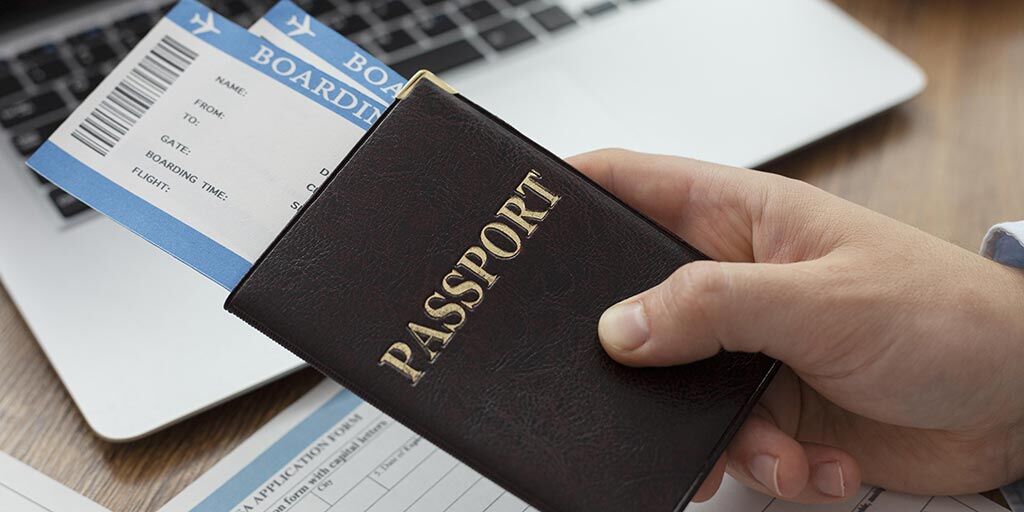
List of Countries Eligible for the Visa on Arrival
- Africa: Namibia, Seychelles, Tunisia
- America: Bolivia, Costa Rica, El Salvador, Mexico, Paraguay, Venezuela
- Asia: Bhutan, China, India, Kazakhstan, Kyrgyzstan, Taiwan, Uzbekistan,
- Europe : Armenia, Belarus, Bulgaria, Georgia, Malta, Romania, Russia, Serbia
- Middle East: Cyprus, Ethiopia, Saudi Arabia
- Oceania: Fiji, Nauru, Papua New Guinea, Vanuatu
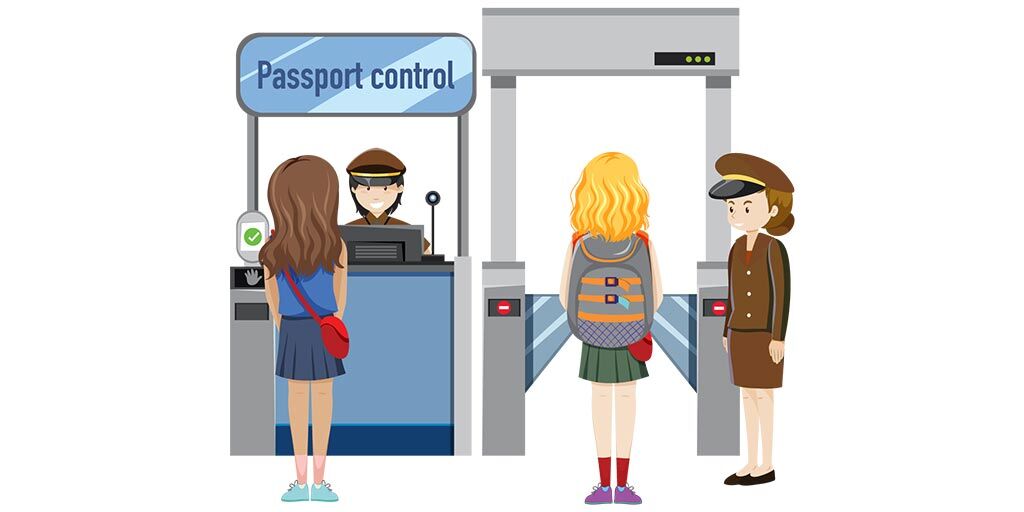
List of Thailand Immigration Checkpoints for Visa on Arrival
- Suvarnabhumi Airport
- Don Muang International Airport, Bangkok
- Chiang Mai International Airport
- Phuket International Airport
- Hatyai International Airport, Songkhla
- U Tapao International Airport, Rayong
- Mae Sai Immigration Checkpoint, Chiang Rai
- Chiang Saen Immigration Checkpoint, Chiang Rai
- Betong Immigration Checkpoint, Yala
- Sadao Immigration Checkpoint, Songkhla
- Samui International Airport, Surat Thani
- Sukhothai International Airport
- Tak Immigration Checkpoint
- Bangkok Harbor Immigration Checkpoint
- Sri Racha Immigration Checkpoint, Chonburi
- Maptaphut Immigration Checkpoint, Rayong
- Nong Khai Immigration Checkpoint
- Samui Immigration Checkpoint, Surat Thani
- Phuket Immigration Checkpoint
- Satun Immigration Checkpoint
- Krabi Immigration Checkpoint
- Songkhla Harbor Immigration Checkpoint
- Chiang Rai Airport Immigration Checkpoint
There are currency exchange counters at major airports. If a traveler is entering Thailand by land, it is best to exchange currency for Thai Baht before leaving their home country.

Long-Term Visa Options for Thailand
Thailand marriage visa.
Persons married to a Thai national can apply for a Thailand Marriage Visa . It allows spouses to reside in Thailand for extended periods, facilitating family reunification and life together in the Kingdom.
Thailand Retirement Visa
Persons 50 years of age or older can apply for the Thailand Retirement Visa . It offers an opportunity for retirees to enjoy extended stays in the country, providing access to various benefits and amenities conducive to a fulfilling retirement lifestyle.
LTR Visa Thailand
By meeting a list of strict criteria, foreigners can obtain a LTR Visa Thailand . Geared towards fostering overseas investment and economic growth, this Thai visa permits holders to reside and work in Thailand for up to a decade. It offers a range of benefits, including access to healthcare, education, and reduced tax burdens. Making it an attractive option for those looking to establish roots in Thailand.
- Thailand Elite Visa
Those desiring a long-term stay but cannot meet stringent visa requirements may apply for a Thailand Elite Visa , which comes with a validity ranging from 5 to up to 20 years. Thailand Elite Visa holders enjoy convenient features that streamline living in Thailand, as well as a wealth of luxury perks and benefits, making it an exceptional choice for those seeking seamless residency in Thailand.
Travel Insurance for Visa on Arrival Visitors

With travel restrictions eased, Thailand has removed the need for Visa on Arrival visitors to provide proof of a valid COVID insurance policy. However, it is important to note that foreign visitors are not eligible for free medical care while in Thailand. If a foreigner requires medical attention, they will need to cover any expenses themselves.
Travel insurance is a wise choice for people traveling abroad. It not only covers COVID-related incidents but also:
- Medical emergencies
- Personal injury and accidents
- Missed or delayed flights
- Damage to belongings
- Lost luggage
For the best coverage possible while visiting Thailand and to avoid potential exclusions or conditions, choose travel insurance designed for Thailand.
AXA Thailand: AXA Sawasdee Thailand
AXA Sawasdee Thailand is a well-known and respected insurance company in Thailand that caters to visitors from all around the world. Their policies are straightforward and trusted by Thai authorities and medical institutions.
For the best Travel Insurance for a Visa on Arrival traveler, you can look to AXA Thailand .

Top Services are provided by Siam Legal International, Thailand’s largest legal service network.
- Thai Retirement Visa
- Thai Notary Service
- Property Lawyer
- Divorce Lawyer Thailand
- US Visa from Thailand
- UK Visa from Thailand
- Litigation Lawyer
- Drafting of Thai Will
- Company Registration Thailand
Related Posts
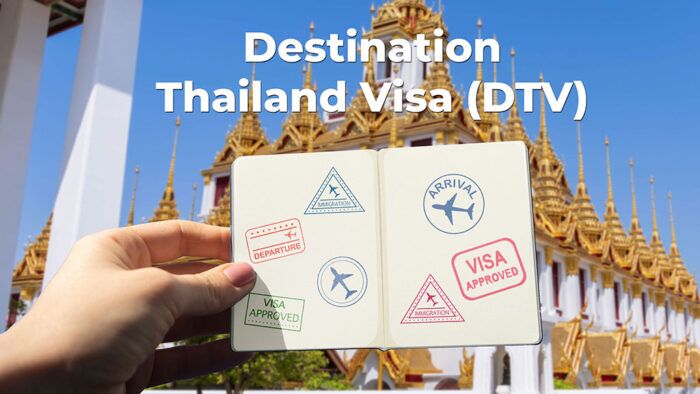
A Guide to the New Destination Thailand Visa (DTV)
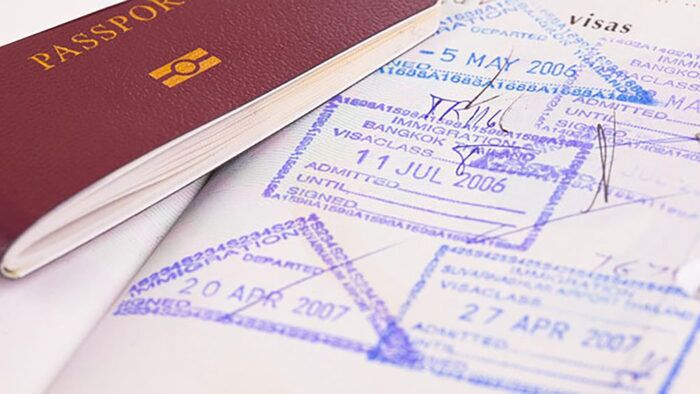
Thailand Visa Exemption (May 2024)
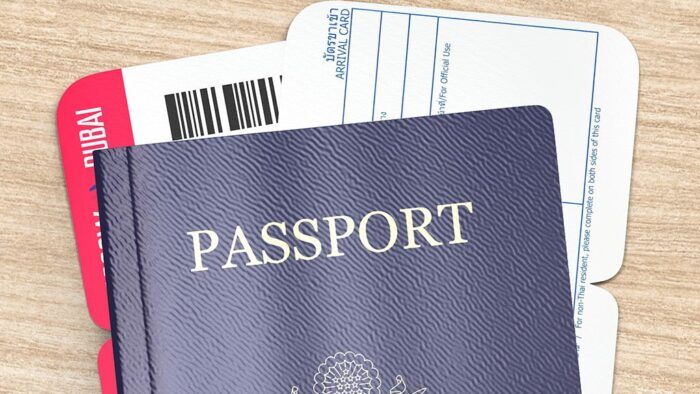
TM6 Requirement Lifted at Land and Sea Checkpoints in Thailand

New Thai Visa Option: Eastern Economic Corridor (EEC) Visa

IMAGES
VIDEO
COMMENTS
Version 9.06.38 (Images in this website is copyrighted of the Tourism Authority of Thailand) ... It is important to note that you are only able to apply if you currently not in Thailand and in the countries where e-Visa services are available. After the e-Visa application has been approved, a confirmation e-mail will be sent to applicants ...
After arrival in Thailand, a tourist visa may be extended at the discretion of an immigration officer once for an additional 30 days with the total period of stay no longer than 90 days. There is a 1,900 Baht fee for the extension. Interested Americans should contact the Thai Immigration Bureau located at Government Center Chaengwattana ...
For those who want to extend their stay in Thailand, you can extend the 60-day Single Entry Tourist Visa by 30 days at a local Immigration Office. The fee for the extension is 1,900 Baht. Under the Multiple Entry Visa, you can extend one of the 60-day stays by a further 30 days. The cost is the same. Under the Multiple Entry Tourist Visa, by ...
A Single Entry Tourist Visa allows foreign nationals one entry into Thailand for tourism, leisure, or medical reasons. It is perfect for those who are looking to relax or maybe complete a scuba diving or Muay Thai training course. People can enter either by air, land, or sea. The visa has a 3-month validity from the time of approval.
Visa Fee. US $30.00 (or equivalent) per entry. The Tourist Visa fee is subject to change, so it is recommended to contact the nearest Thai Embassy or consulate in your area before lodging your paperwork. Thailand tourist visa applications could be lodged online in certain countries.
How Much Is the Thailand Tourist Visa Fee? The Thailand Visa fee changes depending on the country from which you are applying and the local currency. However, as an estimate, the Thai Tourist Visa cost ranges at about $30 to $50 for single-entry visas and about $150 - $250 for multiple-entry visas. ...
Book cheap flights to Thailand . Tourist visas. Thailand tourist visas are priced as below. single-entry Thailand visa (3-month validity): USD 40; multiple-entry Thailand visa (6-month validity): USD 200; Non-Immigrant visas.
Thailand tourist visa fee is 1,000 THB ($30 USD) for a single-entry tourist visa and 5,000 THB ($145 USD) for a multiple-entry tourist visa. You have to pay the visa fee in your local currency, so the visa fee may vary a bit due to currency exchange rates.
The 'Do I need a tourist visa?' section of Thailand's e-visa website is very helpful for identifying requirements based on your nationality. Visa-free entry to Thailand depends on what passport you hold. Thailand allows visa-free entry for tourists from many countries for stays of 30 to 90 days.
To extend your visa-exempt stamp or tourist visa, you'll need the following: 1,900 baht 7- or 30- day visa extension fee. passport valid for at least six more months. 4cm x 6cm photo, taken in the last six months. copy of your passport, and entry stamp. application form, which you can download on the Immigration Bureau's website.
There is the normal 60-day tourist visa that can be extended for additional 30 days, or the 90-day Special Tourist Visa (STV), which can be extended for 90 days twice at a local immigration office. There are certain requirements needed for the STV, but it allows a visitor to potentially stay in Thailand for 9 months.
There are 2 types of tourist visa, namely single entry visa (valid for 3 months), with a fee of 1,000 baht, and multiple entry visa (valid for 12 months), with a fee of 5,000 baht. For both types of visa, upon arrival, travelers are permitted to stay in the Kingdom 60 days per time and must have evidence of adequate finances: 20,000 baht for an ...
The cost of a Tourist Visa for Thailand may vary depending on the applicant's country of origin and the length of stay requested. Typically, a single-entry Tourist Visa fee is around ฿1,000-฿2,000 (approximately $30-$60 USD), while a multiple-entry Tourist Visa fee is around ฿5,000-฿10,000 (approximately $150-$300 USD). ...
The fee for a 6-month Multiple Entry Tourist Visa for Thailand varies depending on the country of the applicant. In general, though, the fee should be in the ballpark of 6,000 Thai baht ($200). Check with your nearest Thai embassy or consulate to see their specific fees. METV visas can also be extended 30 days for an additional 1,900 baht ($60 ...
It costs 1,900 Baht (£45/$55) to extend your visa for 30 days. The extension is available for all visa types including the 30-day exemption, the SETV and the METV. If you have the 30-day exemption, your stay will be extended from 30 to 60 days. If you have the SETV/METV, your stay will be extended from 60 to 90 days.
The Tourist Visa (TR) is a great option for those planning a more extended stay in Thailand. The Tourist Visa typically allows a stay of up to 60 days, which can be extended for an additional 30 days at the discretion of Thai immigration authorities for a total of 3 months. You can opt for either a single-entry or multiple-entry tourist visa ...
How Much is the Thailand Tourist Visa Fee? A Thailand visa fee varies based on the nation from which you apply and the national currency. But, as a reasonable approximation, the Thai Tourist Visa costs. Single-entry visas: $30 to $50; Multiple-entry visas: $150 to $250;
Tourist (3 months validity / Up to 60 days / Single Entry) 30: 3. Tourist (6 months validity / Up to 60 days / Multiple Entries) 150 ... on visa fees exemption with Thailand . 1. Malaysia 2. The Philippines (visa fee exemption for stay of not exceeding 59 days) 3. Singapore 4. ...
Overstaying your visa. If you stay beyond the period of your visa, you will be fined 500 Thai baht a day up to a maximum of 20,000 baht. You risk being: held in detention; deported at your own expense
This is why they ask for a certain amount of bank balance when you apply for a tourist visa. The exact amount required can vary depending on your situation and the type of visa you are applying for. However, as a general rule, you should have at least 20,000 Thai Baht (around 600 US Dollars) in your bank account if you are traveling alone, or ...
A Multi-Entry Tourist Visa allows foreign nationals unlimited entry to Thailand over a 6-month period. It is issued to people who visit the country for tourism, leisure, or medical purposes. A multi-entry visa allows the holder to stay in Thailand for up to 60 days per visit.
In a significant move to boost tourism, the Government of India has announced a visa fee exemption scheme for Thai passport holders. According to a press release issued by the Embassy of India in Bangkok, Thailand, the exemption applies to e-Tourist visas and will be effective from July 1 to December 31, 2024.
Special Visa to Enter Thailand. The Thailand Special Tourist Visa (STV) is a special visa introduced by the Tourism Authority of Thailand for long-stay tourists who would like to travel to Thailand. It is one of the economic measures by the Thai government to restore the local tourism industry that has been affected heavily by COVID-19.
The Destination Thailand Visa is a big departure from Thailand's Long-Term Residence Visa, previously the only way to stay in the country for a prolonged period, which required a $1,600 visa fee ...
Recently we reported on how Barcelona had cracked down on tourism by planning to abolish short-term holiday lets.. The Spanish city has now gone further in its war on overtourism by banning the ...
Updated on June 13, 2024 by Siam Legal International, a Bangkok, Thailand law firm Securing a Visa on Arrival upon Entering Thailand The Visa on Arrival program allows passport holders of 31 listed countries and territories to enter Thailand without needing to apply for a Thailand Tourist Visa from a Royal Thai Embassy or Consulate.